
tensorzero
TensorZero is an open-source stack for industrial-grade LLM applications. It unifies an LLM gateway, observability, optimization, evaluation, and experimentation.
Stars: 10997
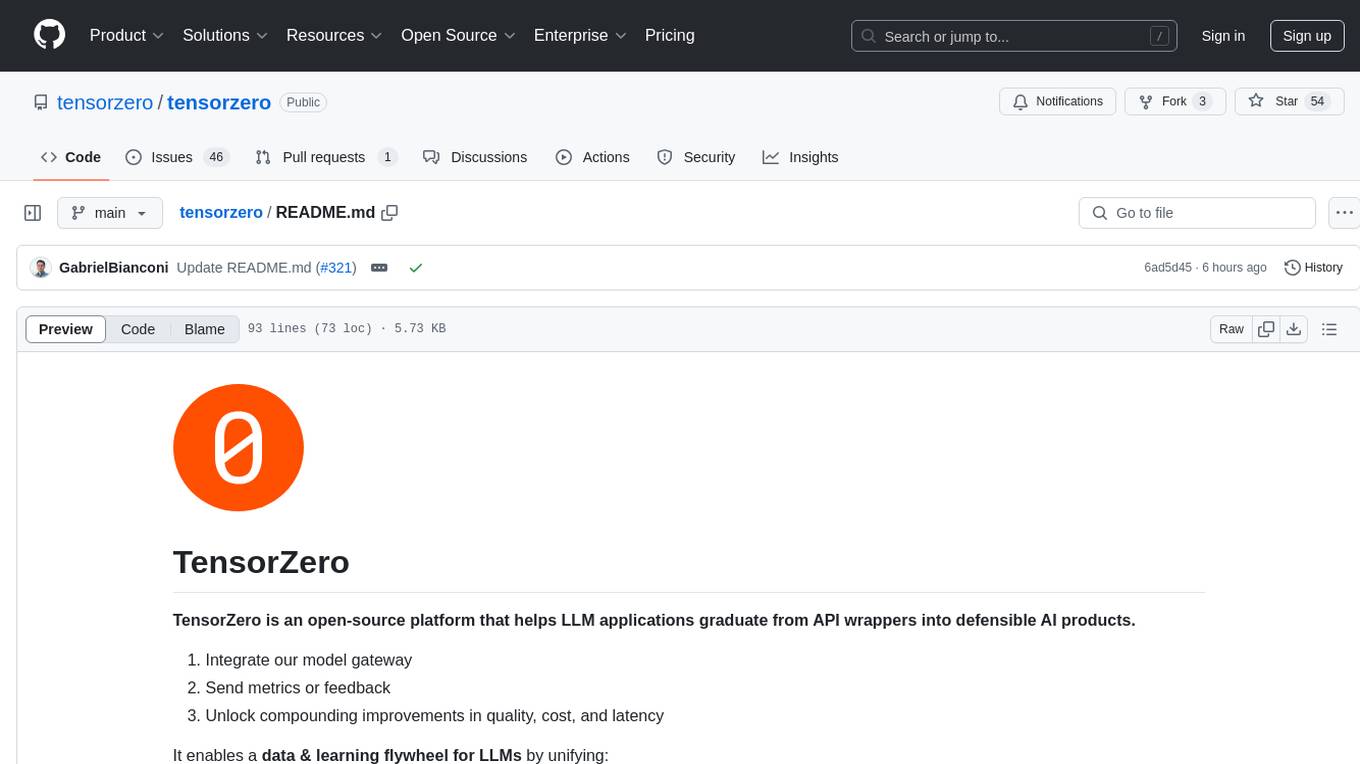
TensorZero is an open-source platform that helps LLM applications graduate from API wrappers into defensible AI products. It enables a data & learning flywheel for LLMs by unifying inference, observability, optimization, and experimentation. The platform includes a high-performance model gateway, structured schema-based inference, observability, experimentation, and data warehouse for analytics. TensorZero Recipes optimize prompts and models, and the platform supports experimentation features and GitOps orchestration for deployment.
README:
TensorZero is an open-source stack for industrial-grade LLM applications:
- Gateway: access every LLM provider through a unified API, built for performance (<1ms p99 latency)
- Observability: store inferences and feedback in your database, available programmatically or in the UI
- Optimization: collect metrics and human feedback to optimize prompts, models, and inference strategies
- Evaluation: benchmark individual inferences or end-to-end workflows using heuristics, LLM judges, etc.
- Experimentation: ship with confidence with built-in A/B testing, routing, fallbacks, retries, etc.
Take what you need, adopt incrementally, and complement with other tools.
Website
·
Docs
·
Twitter
·
Slack
·
Discord
Quick Start (5min)
·
Deployment Guide
·
API Reference
·
Configuration Reference
[!NOTE]
TensorZero Autopilot is an automated AI engineer (powered by the TensorZero Stack) that analyzes LLM observability data, optimizes prompts and models, sets up evals, and runs A/B tests. Learn more Join the waitlist
Integrate with TensorZero once and access every major LLM provider.
- [x] Call any LLM (API or self-hosted) through a single unified API
- [x] Infer with streaming, tool use, structured outputs (JSON), batch, embeddings, multimodal (images, files), caching, etc.
- [x] Create prompt templates and schemas to enforce a consistent, typed interface between your application and the LLMs
- [x] Satisfy extreme throughput and latency needs, thanks to 🦀 Rust: <1ms p99 latency overhead at 10k+ QPS
- [x] Use any programming language: integrate via our Python SDK, any OpenAI SDK, or our HTTP API
- [x] Ensure high availability with routing, retries, fallbacks, load balancing, granular timeouts, etc.
- [x] Enforce custom rate limits with granular scopes (e.g. user-defined tags) to keep usage under control
- [x] Set up auth for TensorZero to allow clients to access models without sharing provider API keys
- [ ] Soon: spend tracking and budgeting
Supported Model Providers: Anthropic, AWS Bedrock, AWS SageMaker, Azure, DeepSeek, Fireworks, GCP Vertex AI Anthropic, GCP Vertex AI Gemini, Google AI Studio (Gemini API), Groq, Hyperbolic, Mistral, OpenAI, OpenRouter, SGLang, TGI, Together AI, vLLM, and xAI (Grok). Need something else? TensorZero also supports any OpenAI-compatible API (e.g. Ollama).
Usage: Python — TensorZero SDK
You can access any provider using the TensorZero Python SDK.
pip install tensorzero- Optional: Set up the TensorZero configuration.
- Run inference:
from tensorzero import TensorZeroGateway # or AsyncTensorZeroGateway
with TensorZeroGateway.build_embedded(...) as t0:
response = t0.inference(
model_name="openai::gpt-4o-mini",
# Try other providers easily: "anthropic::claude-sonnet-4-5"
input={
"messages": [
{
"role": "user",
"content": "Write a haiku about TensorZero.",
}
]
},
)See Quick Start for more information.
Usage: Python — OpenAI SDK
You can access any provider using the OpenAI Python SDK with TensorZero.
pip install tensorzero- Optional: Set up the TensorZero configuration.
- Run inference:
from openai import OpenAI # or AsyncOpenAI
from tensorzero import patch_openai_client
client = OpenAI()
patch_openai_client(client, ...)
response = client.chat.completions.create(
model="tensorzero::model_name::openai::gpt-4o-mini",
# Try other providers easily: "tensorzero::model_name::anthropic::claude-sonnet-4-5"
messages=[
{
"role": "user",
"content": "Write a haiku about TensorZero.",
}
],
)See Quick Start for more information.
Usage: JavaScript / TypeScript (Node) — OpenAI SDK
You can access any provider using the OpenAI Node SDK with TensorZero.
- Deploy
tensorzero/gatewayusing Docker. Detailed instructions → - Set up the TensorZero configuration.
- Run inference:
import OpenAI from "openai";
const client = new OpenAI({
baseURL: "http://localhost:3000/openai/v1",
});
const response = await client.chat.completions.create({
model: "tensorzero::model_name::openai::gpt-4o-mini",
// Try other providers easily: "tensorzero::model_name::anthropic::claude-sonnet-4-5"
messages: [
{
role: "user",
content: "Write a haiku about TensorZero.",
},
],
});See Quick Start for more information.
Usage: Other Languages & Platforms — HTTP API
TensorZero supports virtually any programming language or platform via its HTTP API.
- Deploy
tensorzero/gatewayusing Docker. Detailed instructions → - Optional: Set up the TensorZero configuration.
- Run inference:
curl -X POST "http://localhost:3000/inference" \
-H "Content-Type: application/json" \
-d '{
"model_name": "openai::gpt-4o-mini",
"input": {
"messages": [
{
"role": "user",
"content": "Write a haiku about TensorZero."
}
]
}
}'See Quick Start for more information.
Zoom in to debug individual API calls, or zoom out to monitor metrics across models and prompts over time — all using the open-source TensorZero UI.
- [x] Store inferences and feedback (metrics, human edits, etc.) in your own database
- [x] Dive into individual inferences or high-level aggregate patterns using the TensorZero UI or programmatically
- [x] Build datasets for optimization, evaluation, and other workflows
- [x] Replay historical inferences with new prompts, models, inference strategies, etc.
- [x] Export OpenTelemetry traces (OTLP) and export Prometheus metrics to your favorite application observability tools
- [ ] Soon: AI-assisted debugging and root cause analysis; AI-assisted data labeling
| Observability » UI | Observability » Programmatic |
t0.experimental_list_inferences(
function_name="sales_agent",
filters=BooleanMetricFilter(
metric_name="converted_sale",
value=True,
),
# + compound filters
# + search
# + pagination
# ... and more ...
) |
Send production metrics and human feedback to easily optimize your prompts, models, and inference strategies — using the UI or programmatically.
- [x] Optimize your models with supervised fine-tuning, RLHF, and other techniques
- [x] Optimize your prompts with automated prompt engineering algorithms like GEPA and MIPROv2
- [x] Optimize your inference strategy with dynamic in-context learning, best/mixture-of-N sampling, etc.
- [x] Enable a feedback loop for your LLMs: a data & learning flywheel turning production data into smarter, faster, and cheaper models
- [ ] Soon: synthetic data generation
Compare prompts, models, and inference strategies using evaluations powered by heuristics and LLM judges.
- [x] Evaluate individual inferences with inference evaluations powered by heuristics or LLM judges (≈ unit tests for LLMs)
- [x] Evaluate end-to-end workflows with workflow evaluations with complete flexibility (≈ integration tests for LLMs)
- [x] Optimize LLM judges just like any other TensorZero function to align them to human preferences
- [ ] Soon: more built-in evaluators; headless evaluations
Ship with confidence with built-in A/B testing, routing, fallbacks, retries, etc.
- [x] Run adaptive A/B tests to ship with confidence and identify the best prompts and models for your use cases.
- [x] Enforce principled experiments in complex workflows, including support for multi-turn LLM systems, sequential testing, and more.
Build with an open-source stack well-suited for prototypes but designed from the ground up to support the most complex LLM applications and deployments.
- [x] Build simple applications or massive deployments with GitOps-friendly orchestration
- [x] Extend TensorZero with built-in escape hatches, programmatic-first usage, direct database access, and more
- [x] Integrate with third-party tools: specialized observability and evaluations, model providers, agent orchestration frameworks, etc.
- [x] Iterate quickly by experimenting with prompts interactively using the Playground UI
How is TensorZero different from other LLM frameworks?
- TensorZero enables you to optimize complex LLM applications based on production metrics and human feedback.
- TensorZero supports the needs of industrial-grade LLM applications: low latency, high throughput, type safety, self-hosted, GitOps, customizability, etc.
- TensorZero unifies the entire LLMOps stack, creating compounding benefits. For example, LLM evaluations can be used for fine-tuning models alongside AI judges.
Can I use TensorZero with ___?
Yes. Every major programming language is supported. It plays nicely with the OpenAI SDK, OpenTelemetry, and every major LLM.
Is TensorZero production-ready?
Yes. TensorZero is used by companies ranging from frontier AI startups to the Fortune 50.
Here's a case study: Automating Code Changelogs at a Large Bank with LLMs
How much does TensorZero cost?
TensorZero Stack (LLMOps platform) is 100% self-hosted and open-source.
TensorZero Autopilot (automated AI engineer) is a complementary paid product powered by the TensorZero Stack.
Who is building TensorZero?
Our technical team includes a former Rust compiler maintainer, machine learning researchers (Stanford, CMU, Oxford, Columbia) with thousands of citations, and the chief product officer of a decacorn startup. We're backed by the same investors as leading open-source projects (e.g. ClickHouse, CockroachDB) and AI labs (e.g. OpenAI, Anthropic). See our $7.3M seed round announcement and coverage from VentureBeat. We're hiring in NYC.
How do I get started?
You can adopt TensorZero incrementally. Our Quick Start goes from a vanilla OpenAI wrapper to a production-ready LLM application with observability and fine-tuning in just 5 minutes.
Watch LLMs get better at data extraction in real-time with TensorZero!
Dynamic in-context learning (DICL) is a powerful inference-time optimization available out of the box with TensorZero. It enhances LLM performance by automatically incorporating relevant historical examples into the prompt, without the need for model fine-tuning.
https://github.com/user-attachments/assets/4df1022e-886e-48c2-8f79-6af3cdad79cb
Start building today. The Quick Start shows it's easy to set up an LLM application with TensorZero.
Questions? Ask us on Slack or Discord.
Using TensorZero at work? Email us at [email protected] to set up a Slack or Teams channel with your team (free).
We are working on a series of complete runnable examples illustrating TensorZero's data & learning flywheel.
Optimizing Data Extraction (NER) with TensorZero
This example shows how to use TensorZero to optimize a data extraction pipeline. We demonstrate techniques like fine-tuning and dynamic in-context learning (DICL). In the end, an optimized GPT-4o Mini model outperforms GPT-4o on this task — at a fraction of the cost and latency — using a small amount of training data.
Agentic RAG — Multi-Hop Question Answering with LLMs
This example shows how to build a multi-hop retrieval agent using TensorZero. The agent iteratively searches Wikipedia to gather information, and decides when it has enough context to answer a complex question.
Writing Haikus to Satisfy a Judge with Hidden Preferences
This example fine-tunes GPT-4o Mini to generate haikus tailored to a specific taste. You'll see TensorZero's "data flywheel in a box" in action: better variants leads to better data, and better data leads to better variants. You'll see progress by fine-tuning the LLM multiple times.
Image Data Extraction — Multimodal (Vision) Fine-tuning
This example shows how to fine-tune multimodal models (VLMs) like GPT-4o to improve their performance on vision-language tasks. Specifically, we'll build a system that categorizes document images (screenshots of computer science research papers).
Improving LLM Chess Ability with Best-of-N Sampling
This example showcases how best-of-N sampling can significantly enhance an LLM's chess-playing abilities by selecting the most promising moves from multiple generated options.
We write about LLM engineering on the TensorZero Blog. Here are some of our favorite posts:
- Bandits in your LLM Gateway: Improve LLM Applications Faster with Adaptive Experimentation (A/B Testing)
- Is OpenAI's Reinforcement Fine-Tuning (RFT) Worth It?
- Distillation with Programmatic Data Curation: Smarter LLMs, 5-30x Cheaper Inference
- From NER to Agents: Does Automated Prompt Engineering Scale to Complex Tasks?
For Tasks:
Click tags to check more tools for each tasksFor Jobs:
Alternative AI tools for tensorzero
Similar Open Source Tools

tensorzero
TensorZero is an open-source platform that helps LLM applications graduate from API wrappers into defensible AI products. It enables a data & learning flywheel for LLMs by unifying inference, observability, optimization, and experimentation. The platform includes a high-performance model gateway, structured schema-based inference, observability, experimentation, and data warehouse for analytics. TensorZero Recipes optimize prompts and models, and the platform supports experimentation features and GitOps orchestration for deployment.
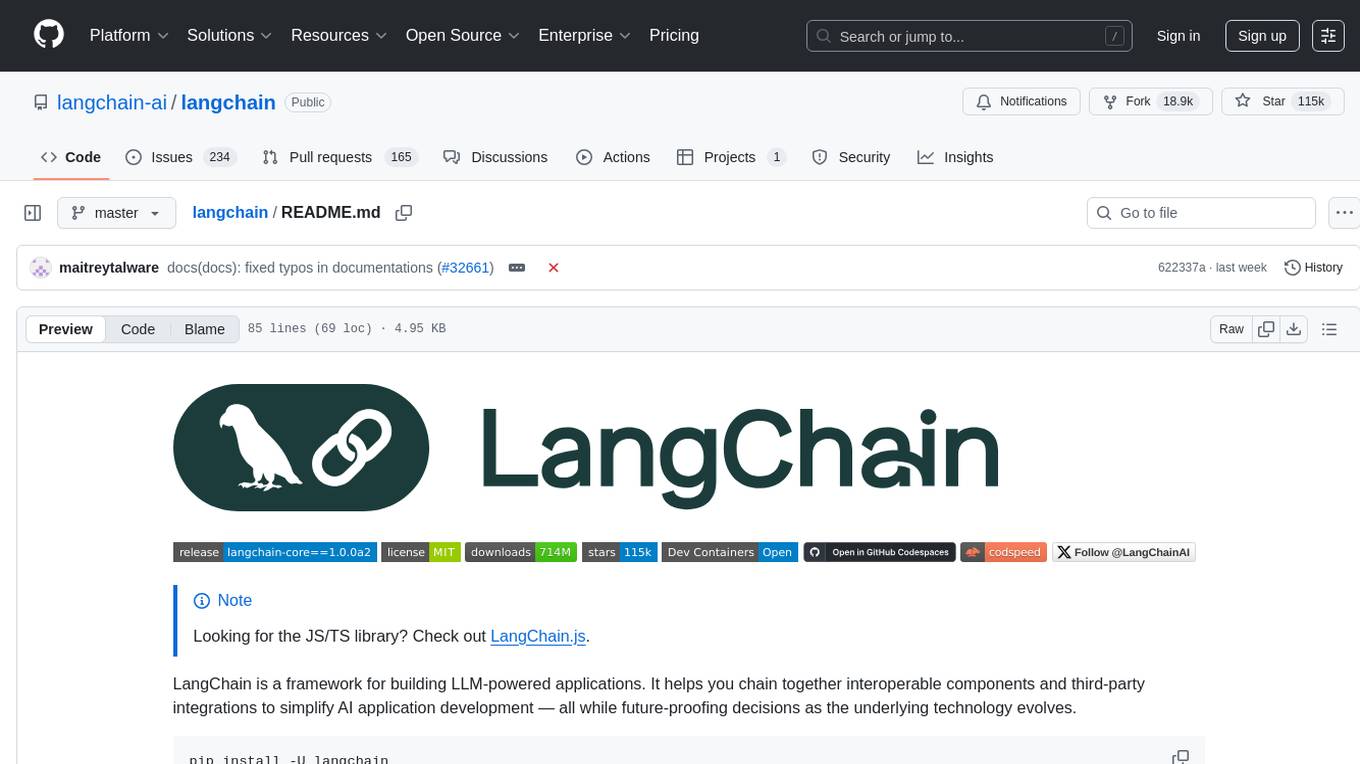
langchain
LangChain is a framework for building LLM-powered applications that simplifies AI application development by chaining together interoperable components and third-party integrations. It helps developers connect LLMs to diverse data sources, swap models easily, and future-proof decisions as technology evolves. LangChain's ecosystem includes tools like LangSmith for agent evals, LangGraph for complex task handling, and LangGraph Platform for deployment and scaling. Additional resources include tutorials, how-to guides, conceptual guides, a forum, API reference, and chat support.
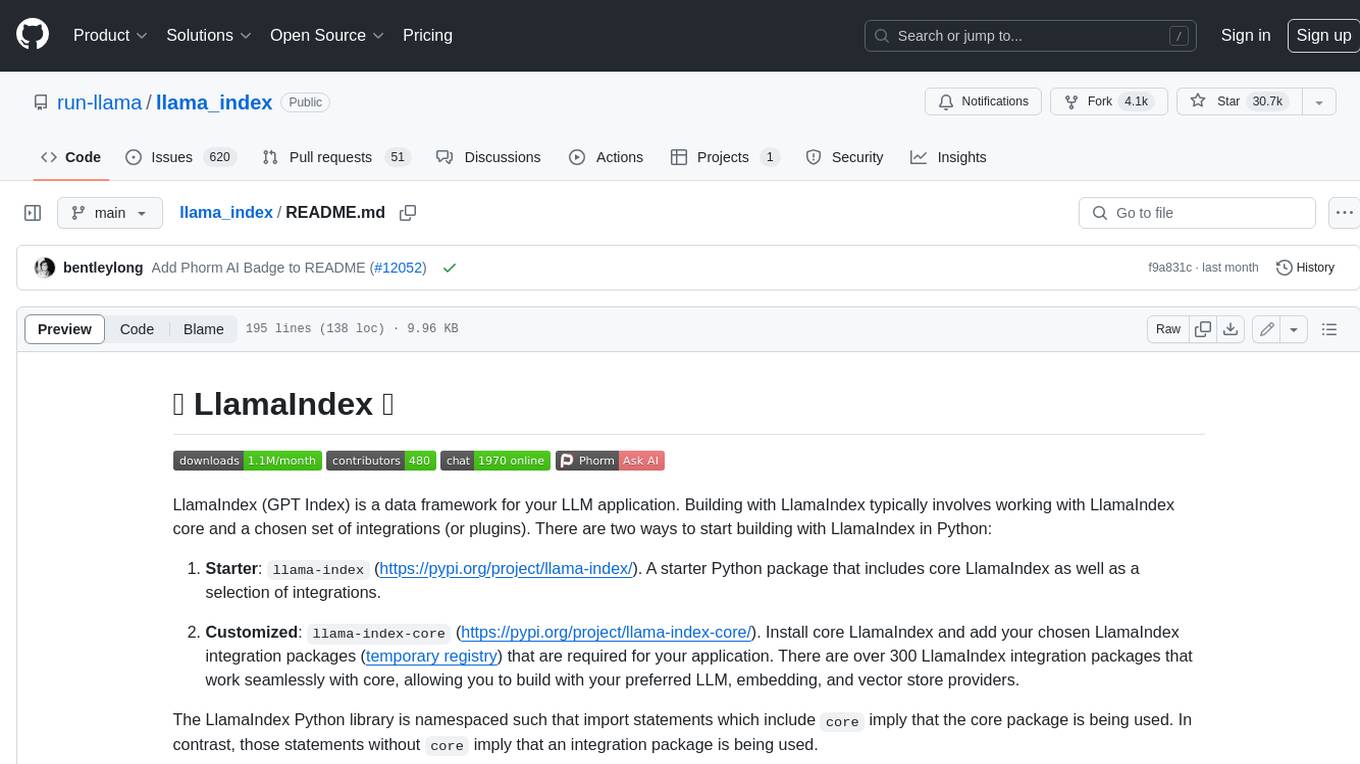
llama_index
LlamaIndex is a data framework for building LLM applications. It provides tools for ingesting, structuring, and querying data, as well as integrating with LLMs and other tools. LlamaIndex is designed to be easy to use for both beginner and advanced users, and it provides a comprehensive set of features for building LLM applications.
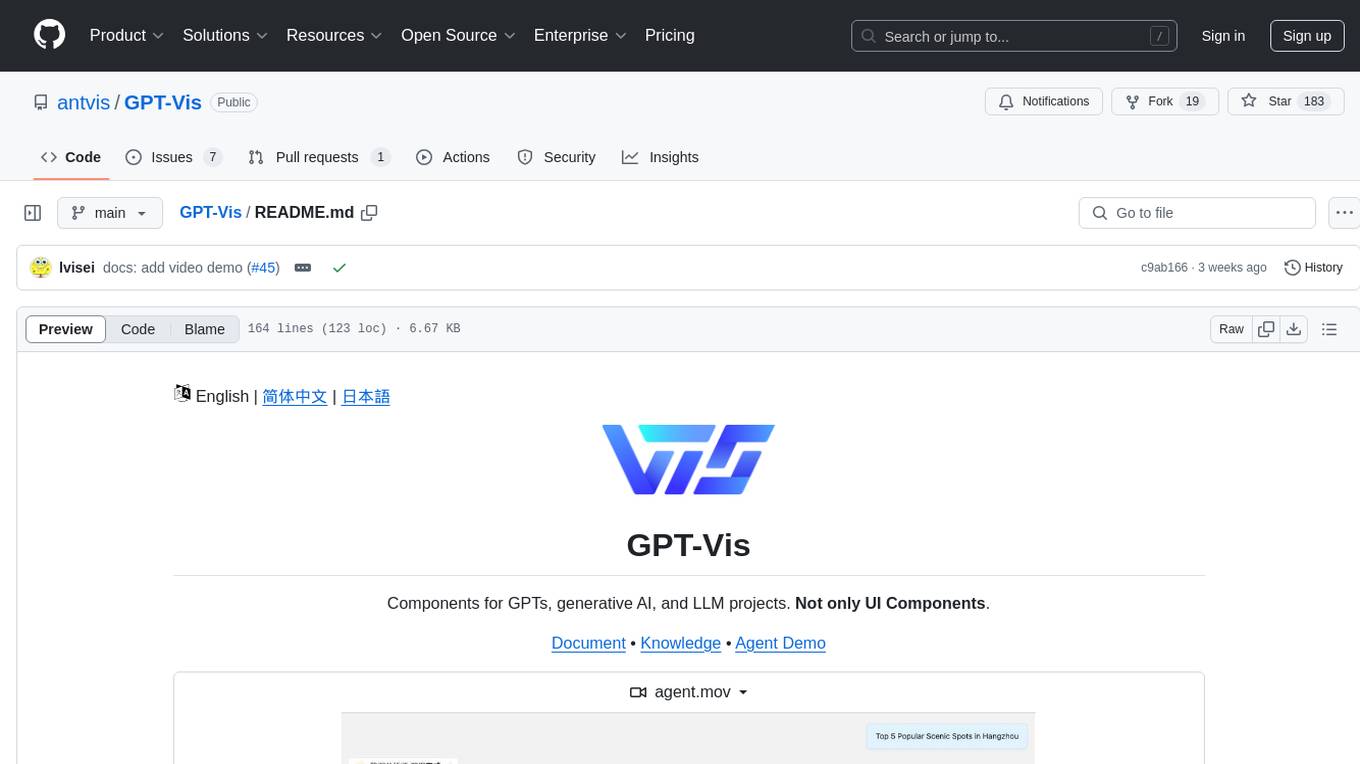
GPT-Vis
GPT-Vis is a tool designed for GPTs, generative AI, and LLM projects. It provides components such as LLM Protocol for conversational interaction, LLM Component for application development, and LLM access for knowledge base and model solutions. The tool aims to facilitate rapid integration into AI applications by offering a visual protocol, built-in components, and chart recommendations for LLM.
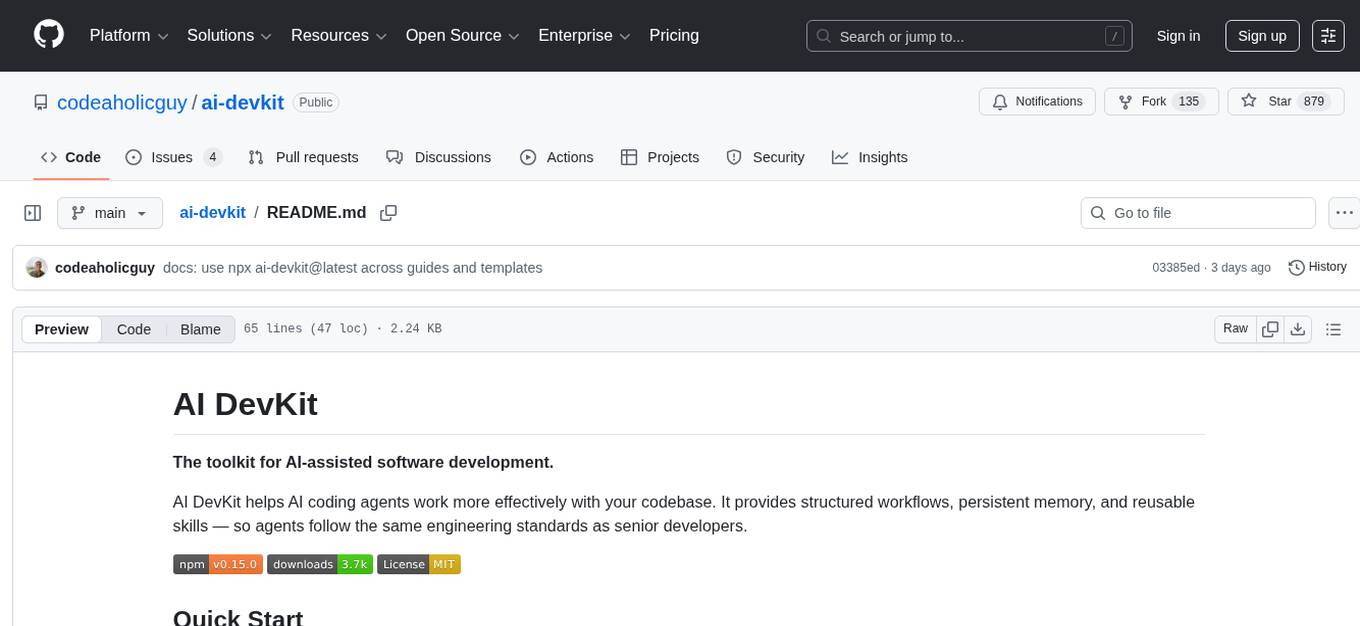
ai-devkit
The ai-devkit repository is a comprehensive toolkit for developing and deploying artificial intelligence models. It provides a wide range of tools and resources to streamline the AI development process, including pre-trained models, data processing utilities, and deployment scripts. With a focus on simplicity and efficiency, ai-devkit aims to empower developers to quickly build and deploy AI solutions across various domains and applications.
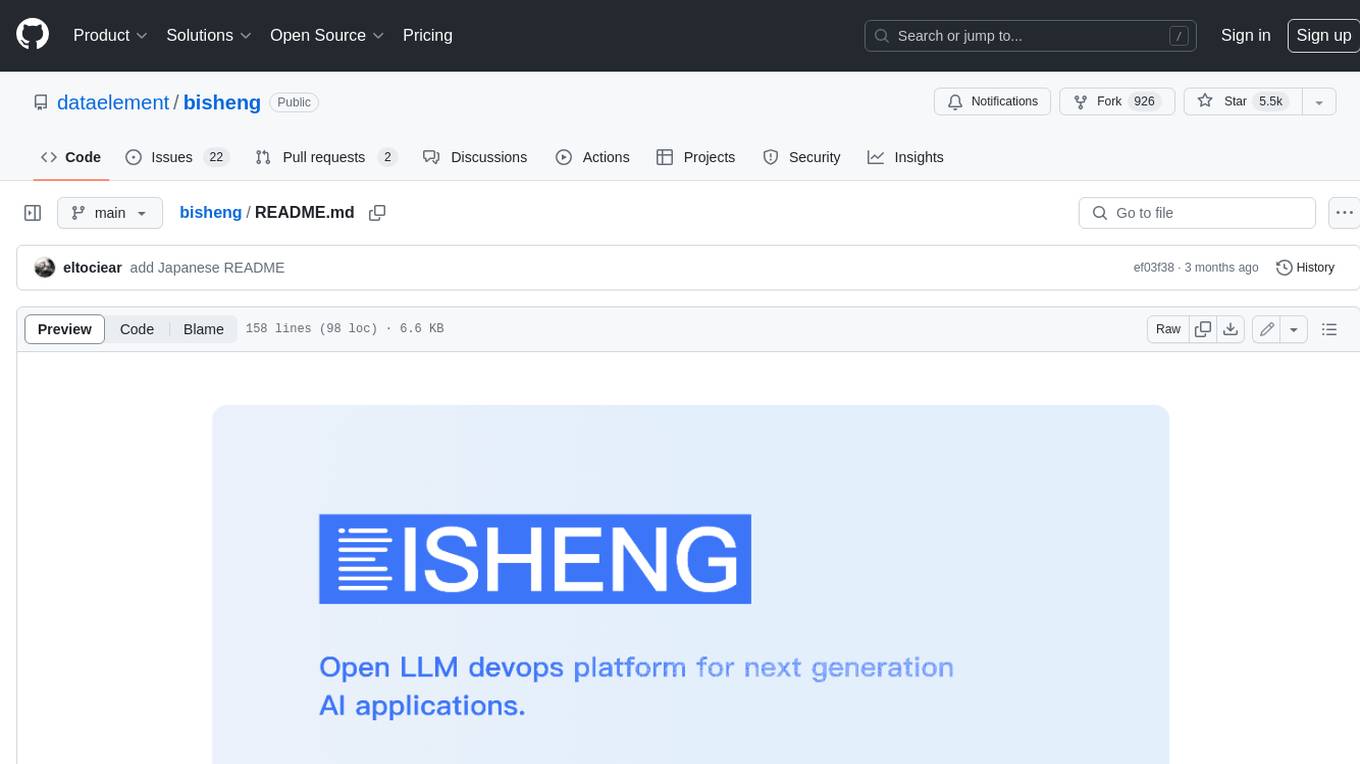
bisheng
Bisheng is a leading open-source **large model application development platform** that empowers and accelerates the development and deployment of large model applications, helping users enter the next generation of application development with the best possible experience.
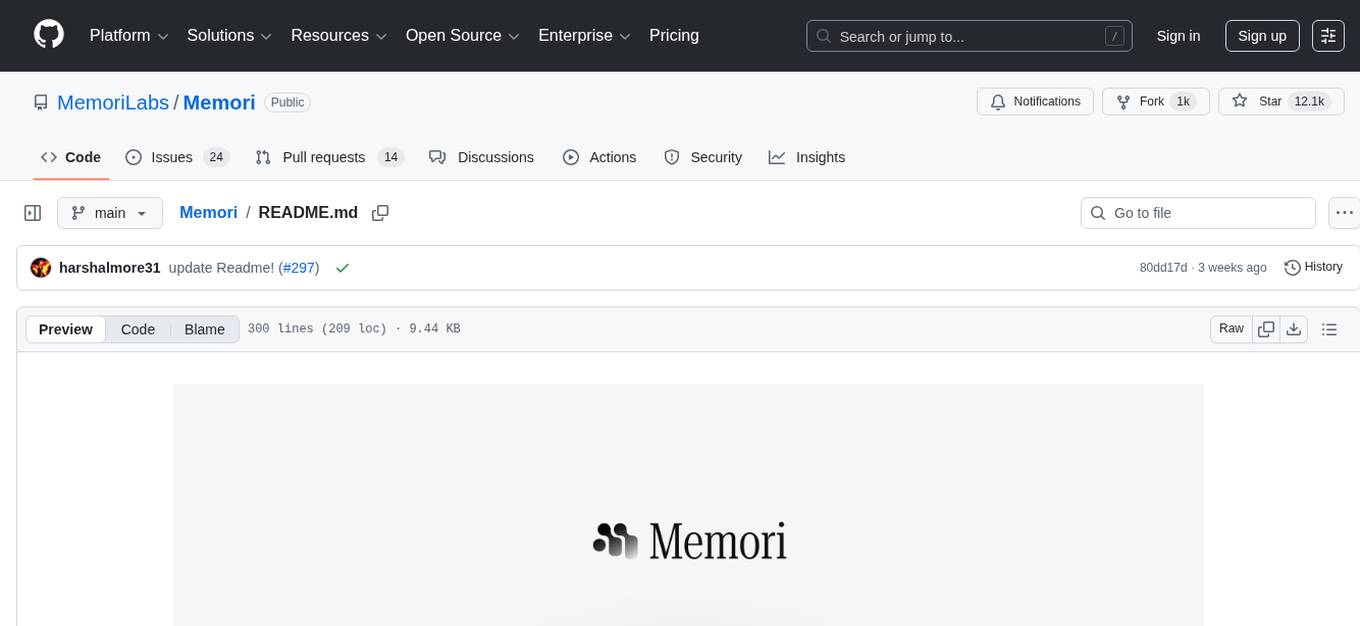
Memori
Memori is a memory fabric designed for enterprise AI that seamlessly integrates into existing software and infrastructure. It is agnostic to LLM, datastore, and framework, providing support for major foundational models and databases. With features like vectorized memories, in-memory semantic search, and a knowledge graph, Memori simplifies the process of attributing LLM interactions and managing sessions. It offers Advanced Augmentation for enhancing memories at different levels and supports various platforms, frameworks, database integrations, and datastores. Memori is designed to reduce development overhead and provide efficient memory management for AI applications.
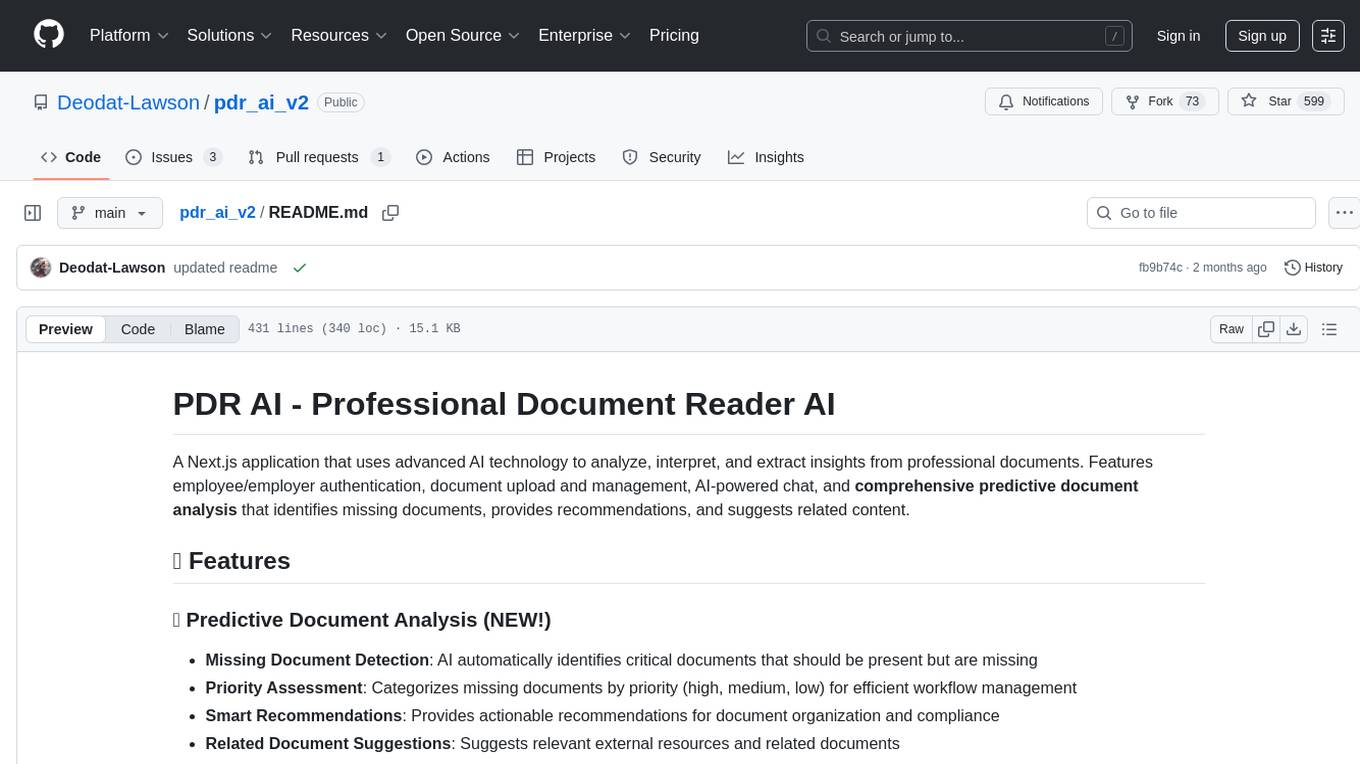
pdr_ai_v2
pdr_ai_v2 is a Python library for implementing machine learning algorithms and models. It provides a wide range of tools and functionalities for data preprocessing, model training, evaluation, and deployment. The library is designed to be user-friendly and efficient, making it suitable for both beginners and experienced data scientists. With pdr_ai_v2, users can easily build and deploy machine learning models for various applications, such as classification, regression, clustering, and more.

deeppowers
Deeppowers is a powerful Python library for deep learning applications. It provides a wide range of tools and utilities to simplify the process of building and training deep neural networks. With Deeppowers, users can easily create complex neural network architectures, perform efficient training and optimization, and deploy models for various tasks. The library is designed to be user-friendly and flexible, making it suitable for both beginners and experienced deep learning practitioners.
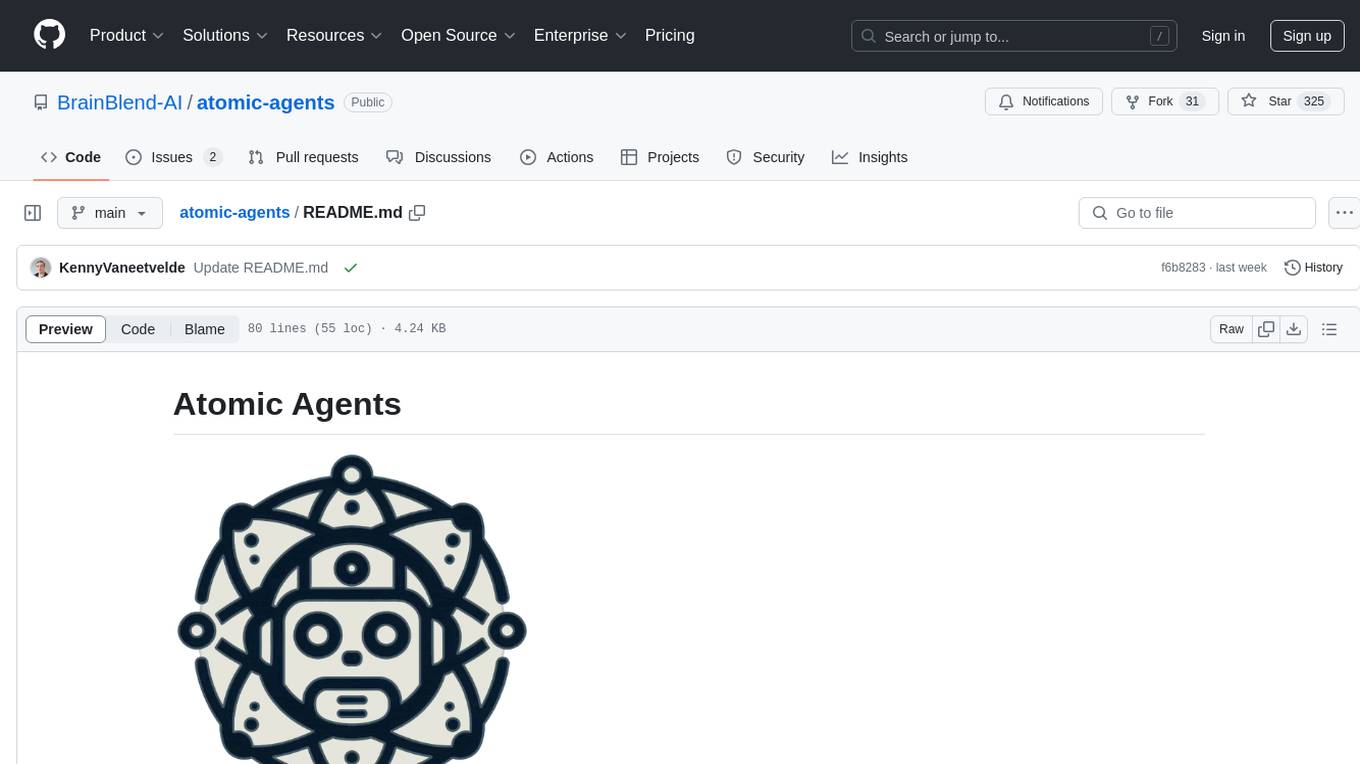
atomic-agents
The Atomic Agents framework is a modular and extensible tool designed for creating powerful applications. It leverages Pydantic for data validation and serialization. The framework follows the principles of Atomic Design, providing small and single-purpose components that can be combined. It integrates with Instructor for AI agent architecture and supports various APIs like Cohere, Anthropic, and Gemini. The tool includes documentation, examples, and testing features to ensure smooth development and usage.
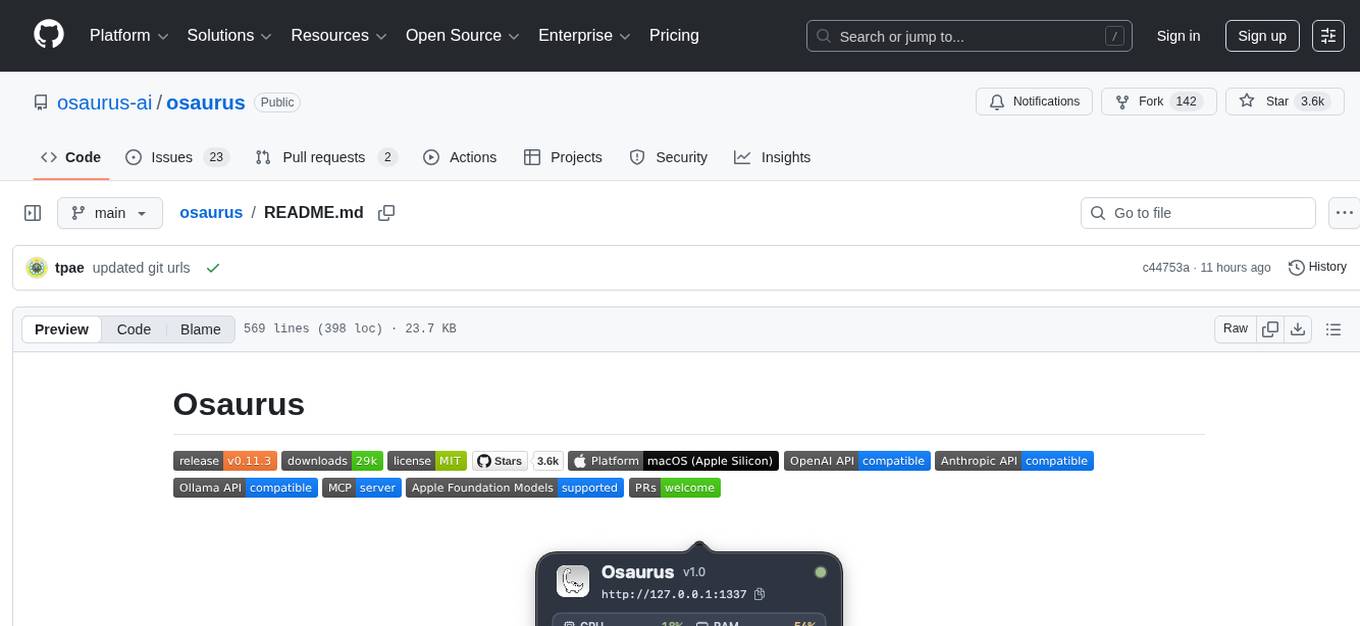
osaurus
Osaurus is a versatile open-source tool designed for data scientists and machine learning engineers. It provides a wide range of functionalities for data preprocessing, feature engineering, model training, and evaluation. With Osaurus, users can easily clean and transform raw data, extract relevant features, build and tune machine learning models, and analyze model performance. The tool supports various machine learning algorithms and techniques, making it suitable for both beginners and experienced practitioners in the field. Osaurus is actively maintained and updated to incorporate the latest advancements in the machine learning domain, ensuring users have access to state-of-the-art tools and methodologies for their projects.
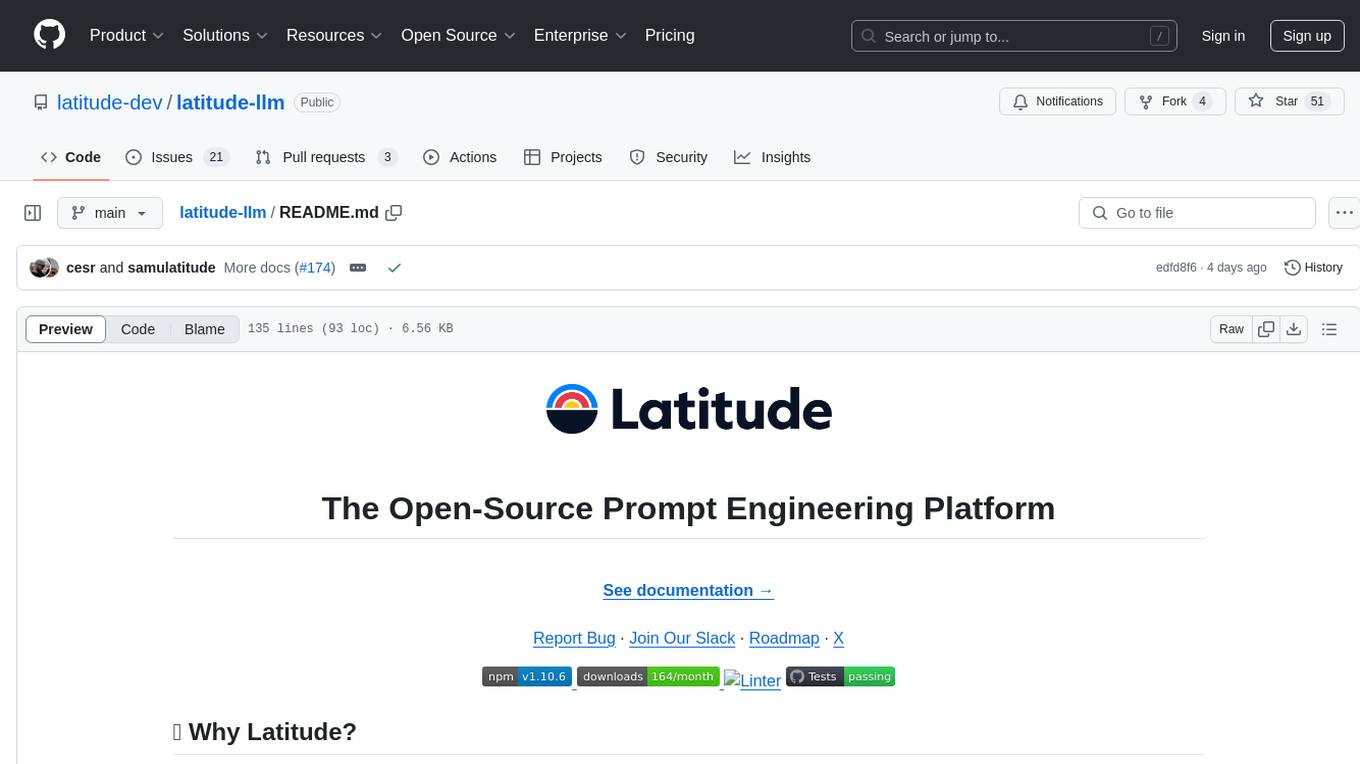
latitude-llm
Latitude is an open-source prompt engineering platform that helps developers and product teams build AI features with confidence. It simplifies prompt management, aids in testing AI responses, and provides detailed analytics on request performance. Latitude offers collaborative prompt management, support for advanced features, version control, API and SDKs for integration, observability, evaluations in batch or real-time, and is community-driven. It can be deployed on Latitude Cloud for a managed solution or self-hosted for control and customization.

koog
Koog is a Kotlin-based framework for building and running AI agents entirely in idiomatic Kotlin. It allows users to create agents that interact with tools, handle complex workflows, and communicate with users. Key features include pure Kotlin implementation, MCP integration, embedding capabilities, custom tool creation, ready-to-use components, intelligent history compression, powerful streaming API, persistent agent memory, comprehensive tracing, flexible graph workflows, modular feature system, scalable architecture, and multiplatform support.
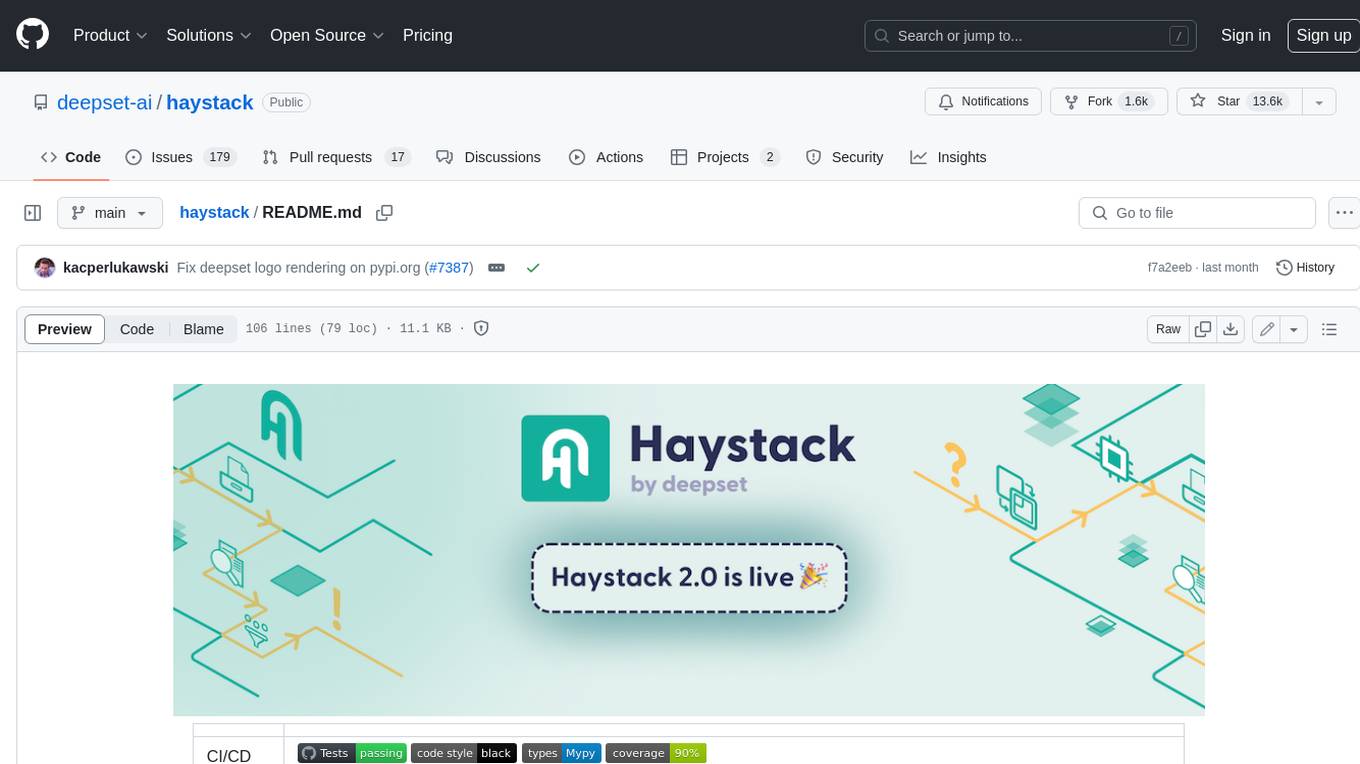
haystack
Haystack is an end-to-end LLM framework that allows you to build applications powered by LLMs, Transformer models, vector search and more. Whether you want to perform retrieval-augmented generation (RAG), document search, question answering or answer generation, Haystack can orchestrate state-of-the-art embedding models and LLMs into pipelines to build end-to-end NLP applications and solve your use case.
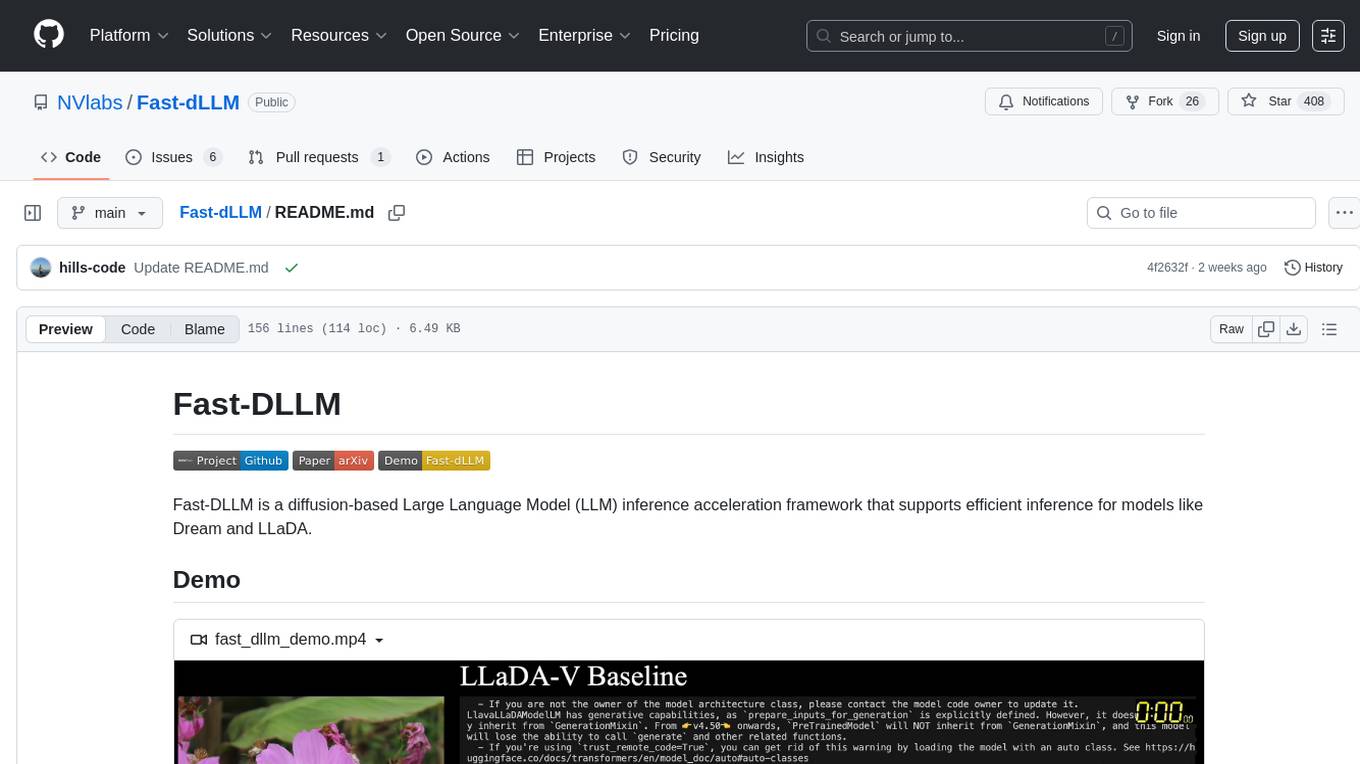
Fast-dLLM
Fast-DLLM is a diffusion-based Large Language Model (LLM) inference acceleration framework that supports efficient inference for models like Dream and LLaDA. It offers fast inference support, multiple optimization strategies, code generation, evaluation capabilities, and an interactive chat interface. Key features include Key-Value Cache for Block-Wise Decoding, Confidence-Aware Parallel Decoding, and overall performance improvements. The project structure includes directories for Dream and LLaDA model-related code, with installation and usage instructions provided for using the LLaDA and Dream models.
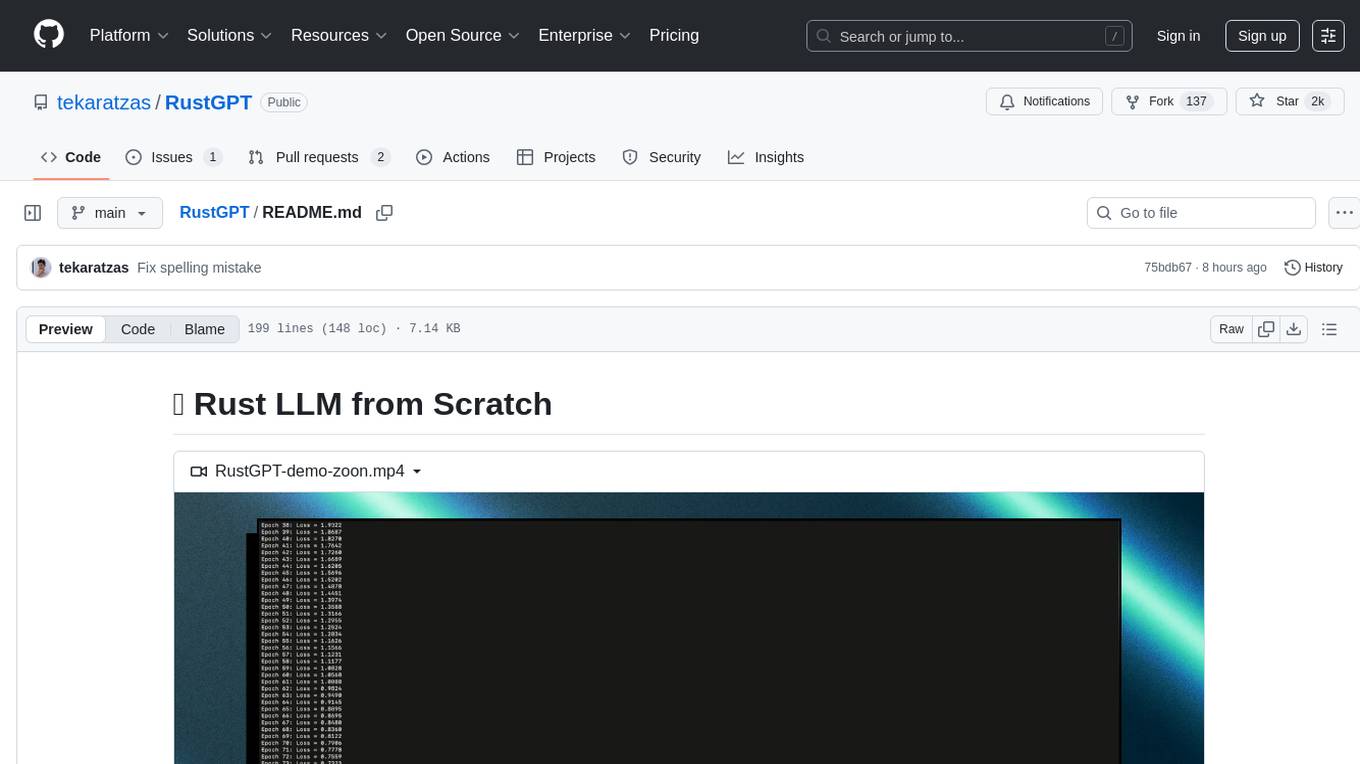
RustGPT
A complete Large Language Model implementation in pure Rust with no external ML frameworks. Demonstrates building a transformer-based language model from scratch, including pre-training, instruction tuning, interactive chat mode, full backpropagation, and modular architecture. Model learns basic world knowledge and conversational patterns. Features custom tokenization, greedy decoding, gradient clipping, modular layer system, and comprehensive test coverage. Ideal for understanding modern LLMs and key ML concepts. Dependencies include ndarray for matrix operations and rand for random number generation. Contributions welcome for model persistence, performance optimizations, better sampling, evaluation metrics, advanced architectures, training improvements, data handling, and model analysis. Follows standard Rust conventions and encourages contributions at beginner, intermediate, and advanced levels.
For similar tasks

Flowise
Flowise is a tool that allows users to build customized LLM flows with a drag-and-drop UI. It is open-source and self-hostable, and it supports various deployments, including AWS, Azure, Digital Ocean, GCP, Railway, Render, HuggingFace Spaces, Elestio, Sealos, and RepoCloud. Flowise has three different modules in a single mono repository: server, ui, and components. The server module is a Node backend that serves API logics, the ui module is a React frontend, and the components module contains third-party node integrations. Flowise supports different environment variables to configure your instance, and you can specify these variables in the .env file inside the packages/server folder.

nlux
nlux is an open-source Javascript and React JS library that makes it super simple to integrate powerful large language models (LLMs) like ChatGPT into your web app or website. With just a few lines of code, you can add conversational AI capabilities and interact with your favourite LLM.
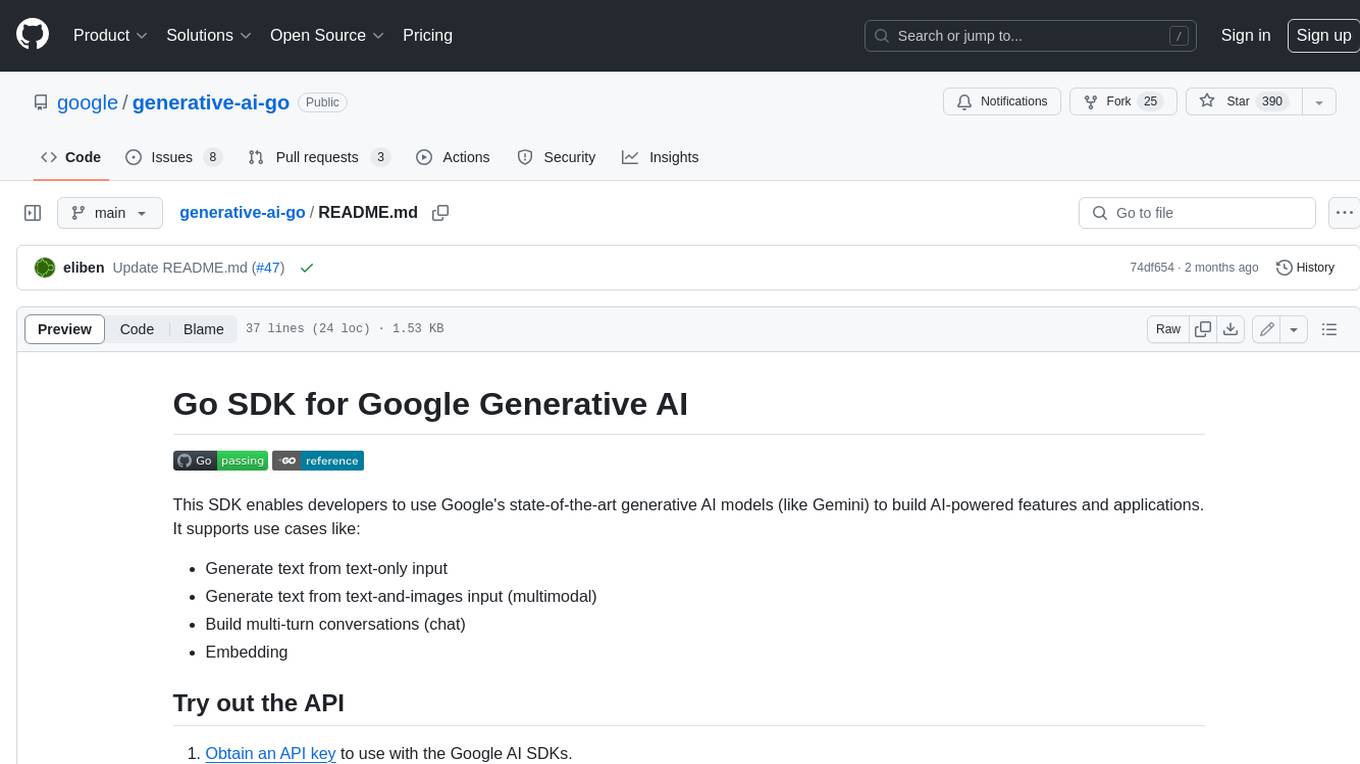
generative-ai-go
The Google AI Go SDK enables developers to use Google's state-of-the-art generative AI models (like Gemini) to build AI-powered features and applications. It supports use cases like generating text from text-only input, generating text from text-and-images input (multimodal), building multi-turn conversations (chat), and embedding.
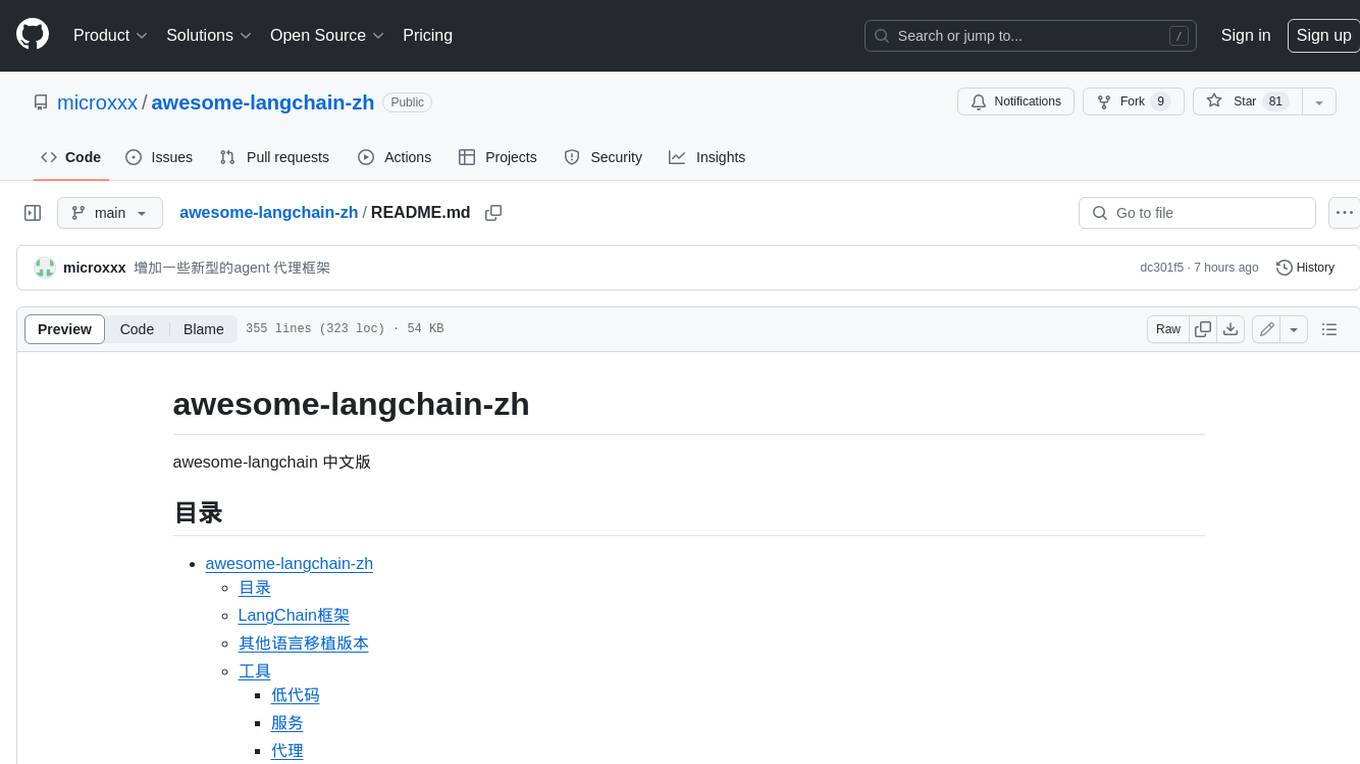
awesome-langchain-zh
The awesome-langchain-zh repository is a collection of resources related to LangChain, a framework for building AI applications using large language models (LLMs). The repository includes sections on the LangChain framework itself, other language ports of LangChain, tools for low-code development, services, agents, templates, platforms, open-source projects related to knowledge management and chatbots, as well as learning resources such as notebooks, videos, and articles. It also covers other LLM frameworks and provides additional resources for exploring and working with LLMs. The repository serves as a comprehensive guide for developers and AI enthusiasts interested in leveraging LangChain and LLMs for various applications.
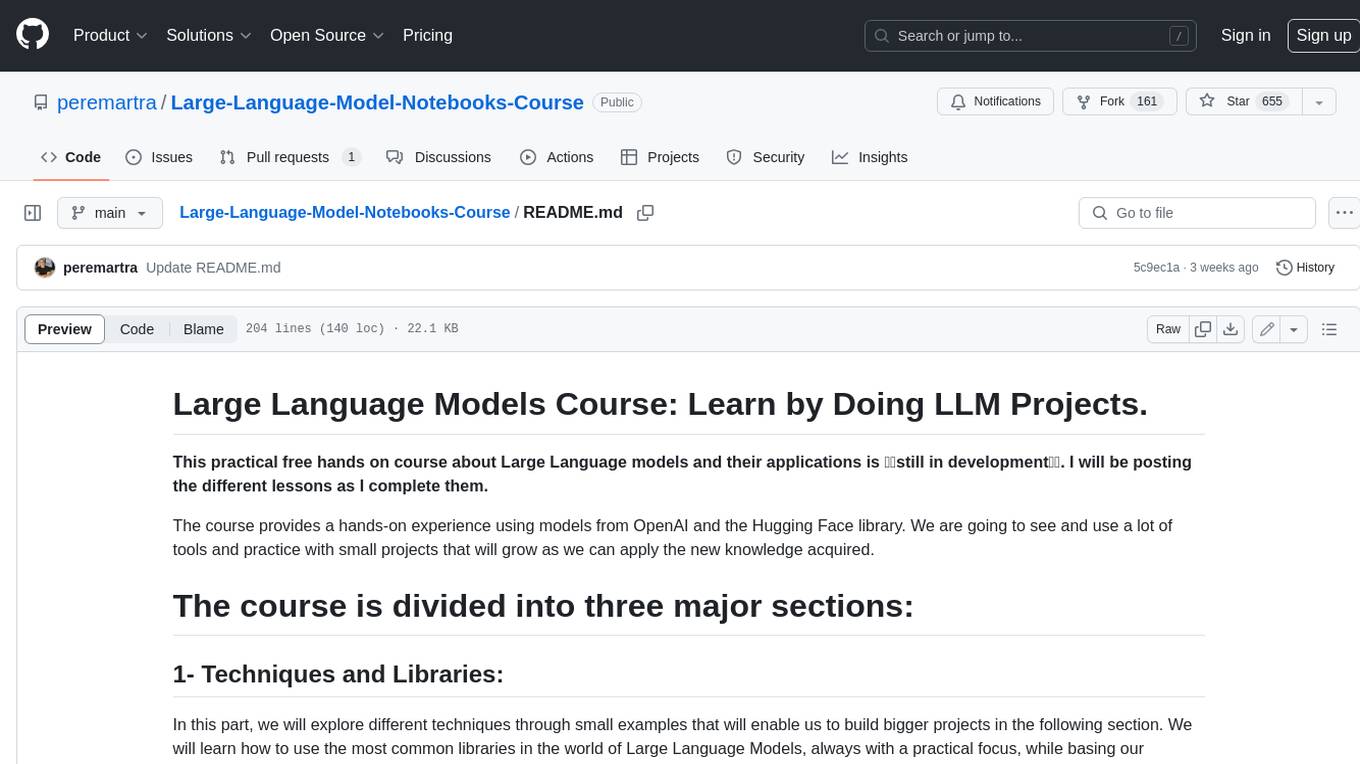
Large-Language-Model-Notebooks-Course
This practical free hands-on course focuses on Large Language models and their applications, providing a hands-on experience using models from OpenAI and the Hugging Face library. The course is divided into three major sections: Techniques and Libraries, Projects, and Enterprise Solutions. It covers topics such as Chatbots, Code Generation, Vector databases, LangChain, Fine Tuning, PEFT Fine Tuning, Soft Prompt tuning, LoRA, QLoRA, Evaluate Models, Knowledge Distillation, and more. Each section contains chapters with lessons supported by notebooks and articles. The course aims to help users build projects and explore enterprise solutions using Large Language Models.
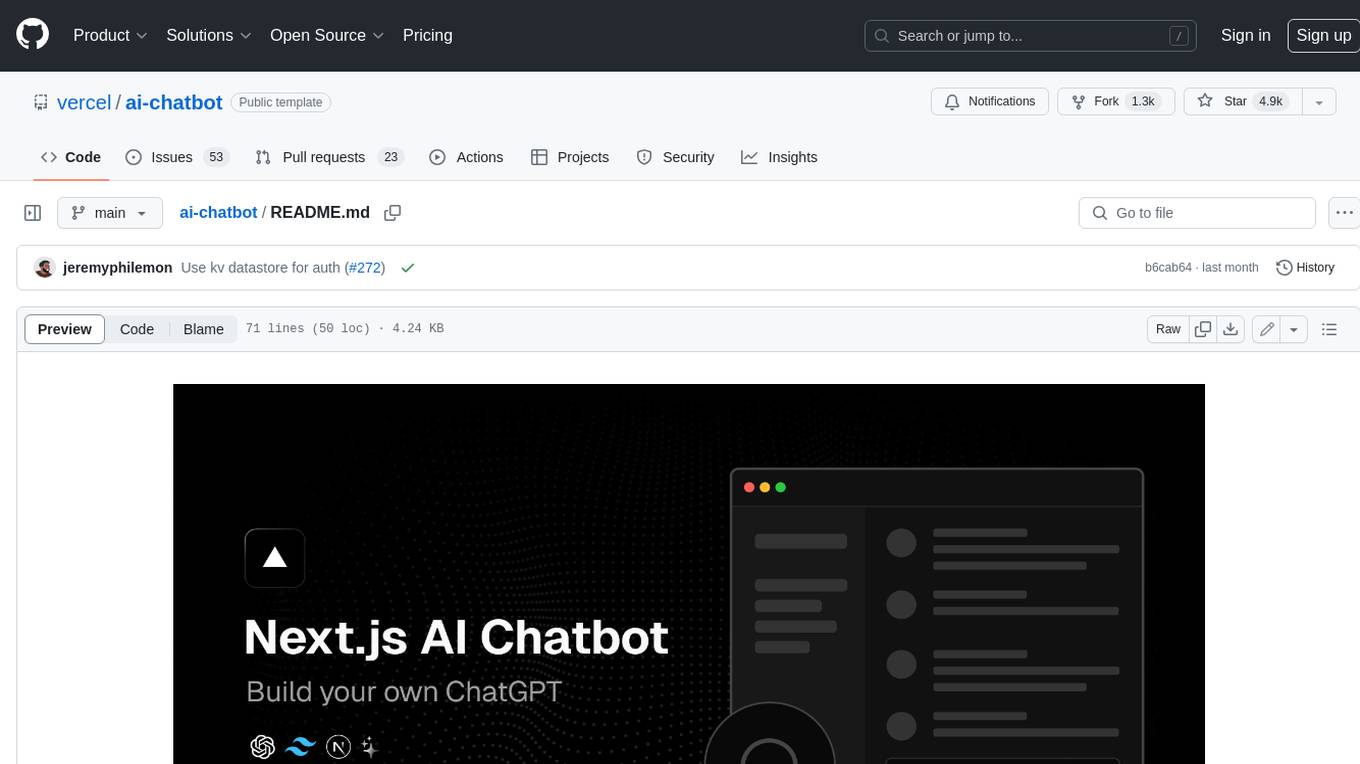
ai-chatbot
Next.js AI Chatbot is an open-source app template for building AI chatbots using Next.js, Vercel AI SDK, OpenAI, and Vercel KV. It includes features like Next.js App Router, React Server Components, Vercel AI SDK for streaming chat UI, support for various AI models, Tailwind CSS styling, Radix UI for headless components, chat history management, rate limiting, session storage with Vercel KV, and authentication with NextAuth.js. The template allows easy deployment to Vercel and customization of AI model providers.
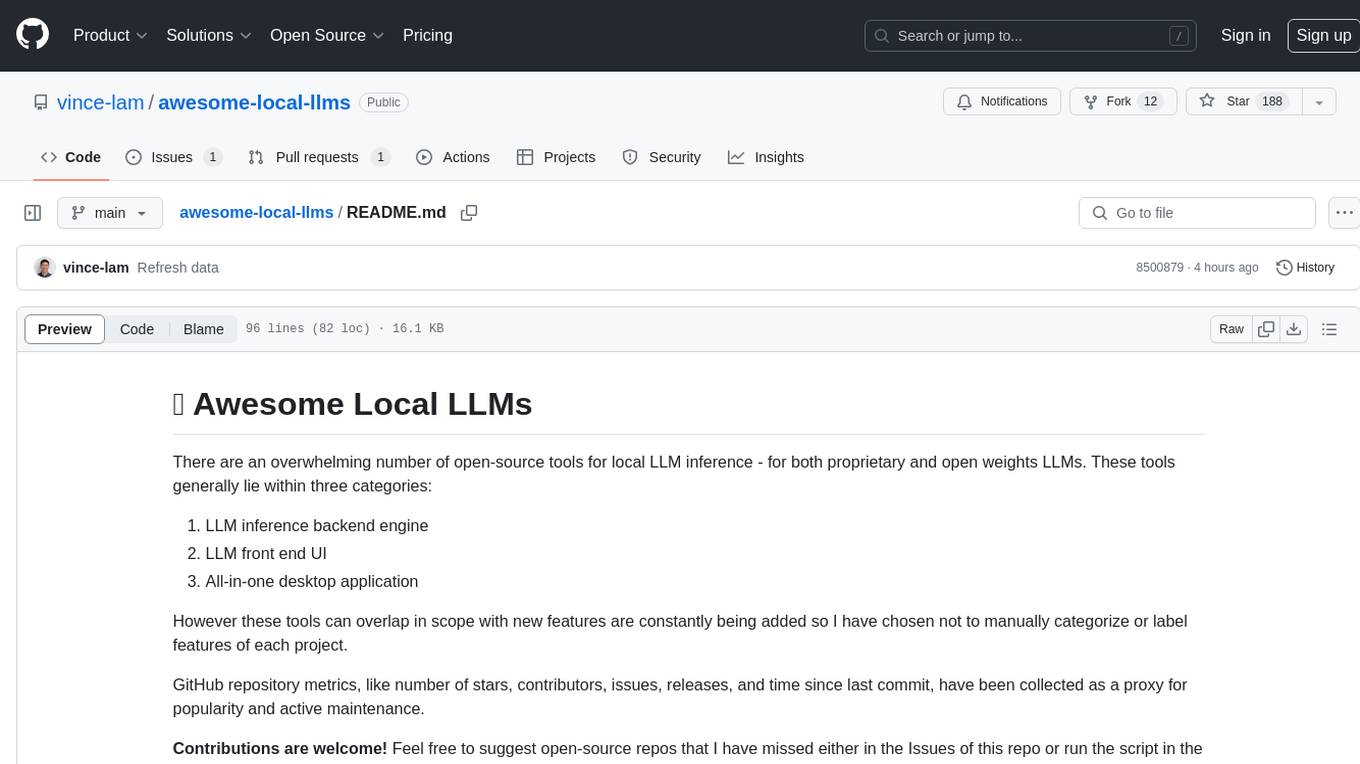
awesome-local-llms
The 'awesome-local-llms' repository is a curated list of open-source tools for local Large Language Model (LLM) inference, covering both proprietary and open weights LLMs. The repository categorizes these tools into LLM inference backend engines, LLM front end UIs, and all-in-one desktop applications. It collects GitHub repository metrics as proxies for popularity and active maintenance. Contributions are encouraged, and users can suggest additional open-source repositories through the Issues section or by running a provided script to update the README and make a pull request. The repository aims to provide a comprehensive resource for exploring and utilizing local LLM tools.
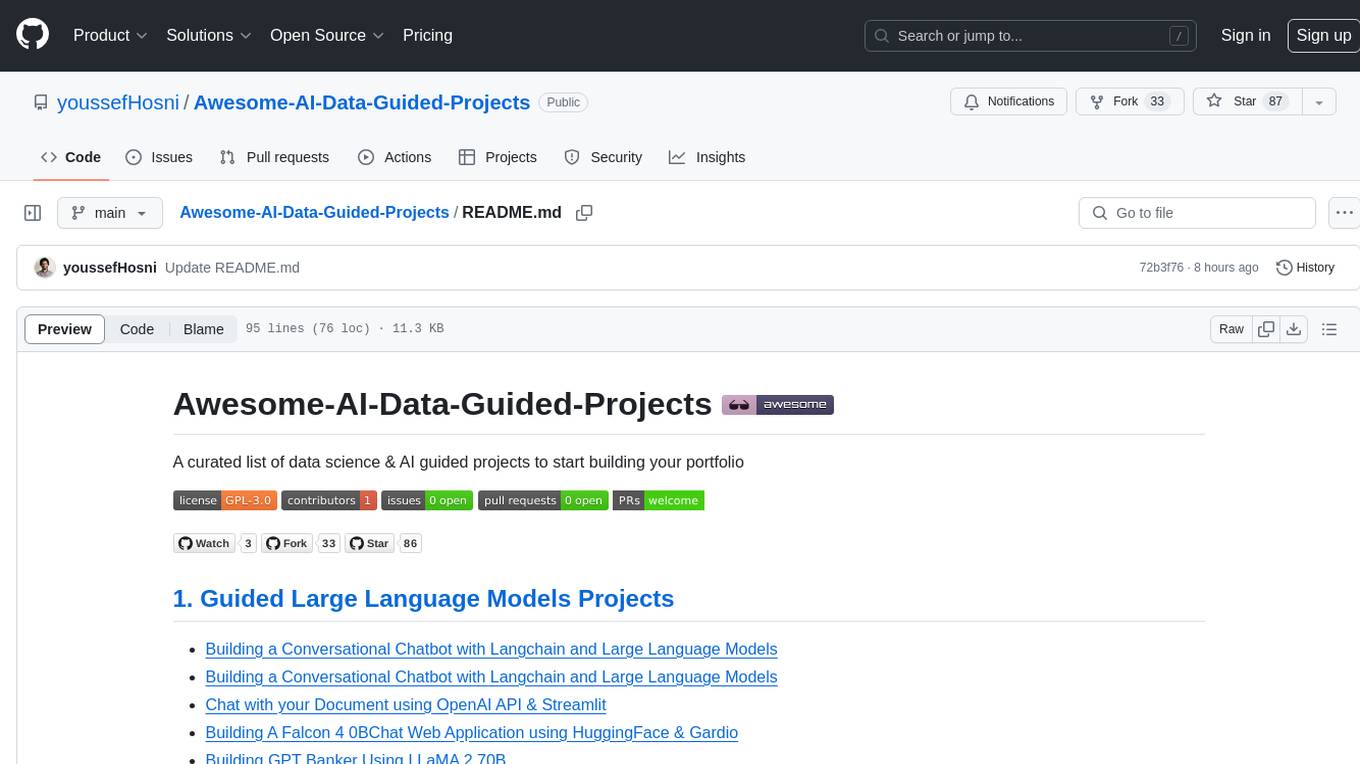
Awesome-AI-Data-Guided-Projects
A curated list of data science & AI guided projects to start building your portfolio. The repository contains guided projects covering various topics such as large language models, time series analysis, computer vision, natural language processing (NLP), and data science. Each project provides detailed instructions on how to implement specific tasks using different tools and technologies.
For similar jobs
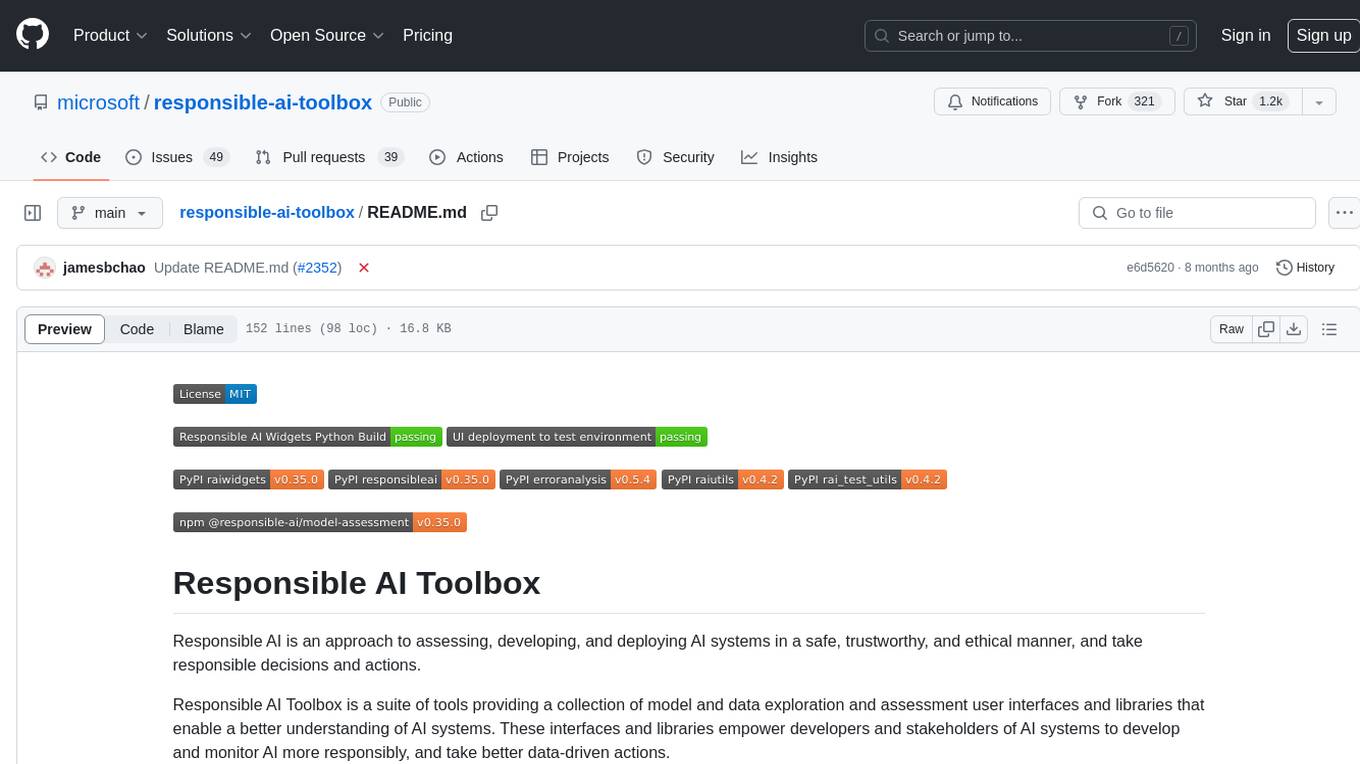
responsible-ai-toolbox
Responsible AI Toolbox is a suite of tools providing model and data exploration and assessment interfaces and libraries for understanding AI systems. It empowers developers and stakeholders to develop and monitor AI responsibly, enabling better data-driven actions. The toolbox includes visualization widgets for model assessment, error analysis, interpretability, fairness assessment, and mitigations library. It also offers a JupyterLab extension for managing machine learning experiments and a library for measuring gender bias in NLP datasets.
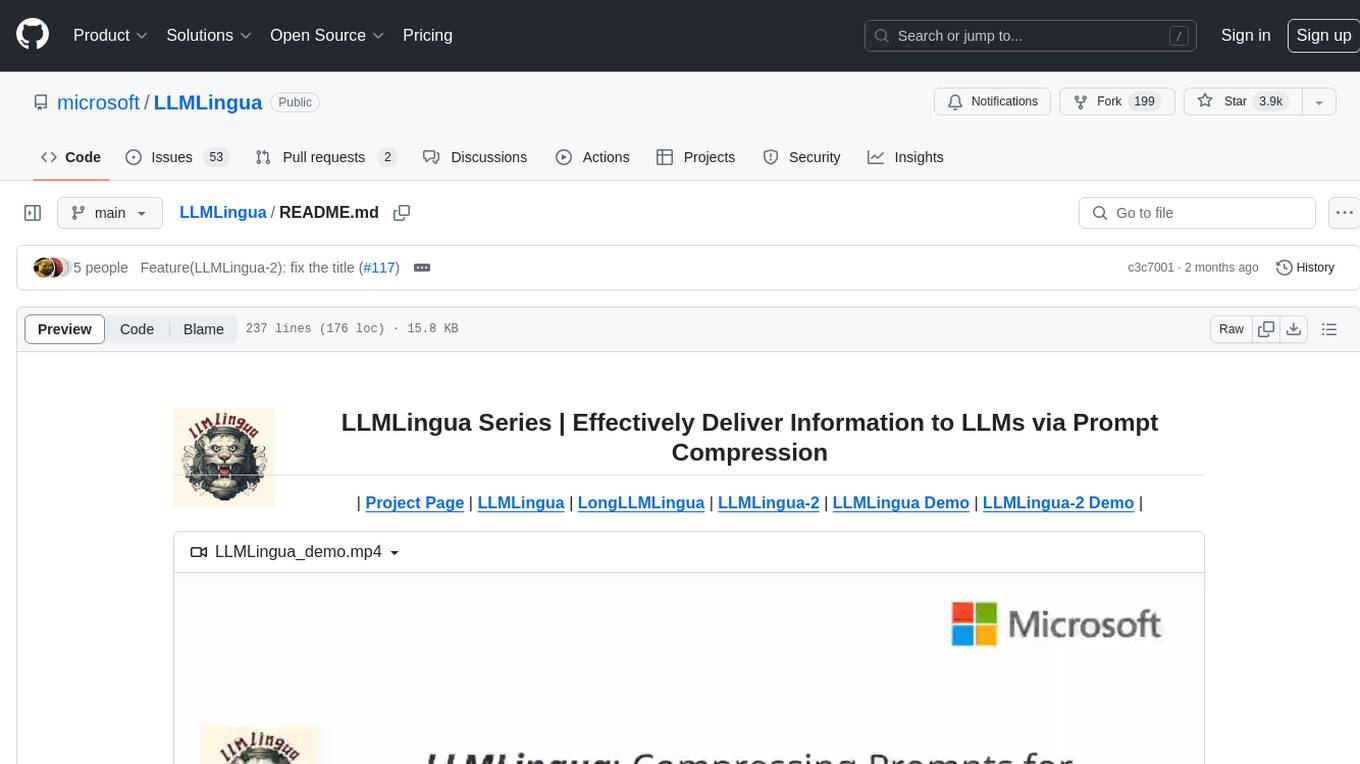
LLMLingua
LLMLingua is a tool that utilizes a compact, well-trained language model to identify and remove non-essential tokens in prompts. This approach enables efficient inference with large language models, achieving up to 20x compression with minimal performance loss. The tool includes LLMLingua, LongLLMLingua, and LLMLingua-2, each offering different levels of prompt compression and performance improvements for tasks involving large language models.
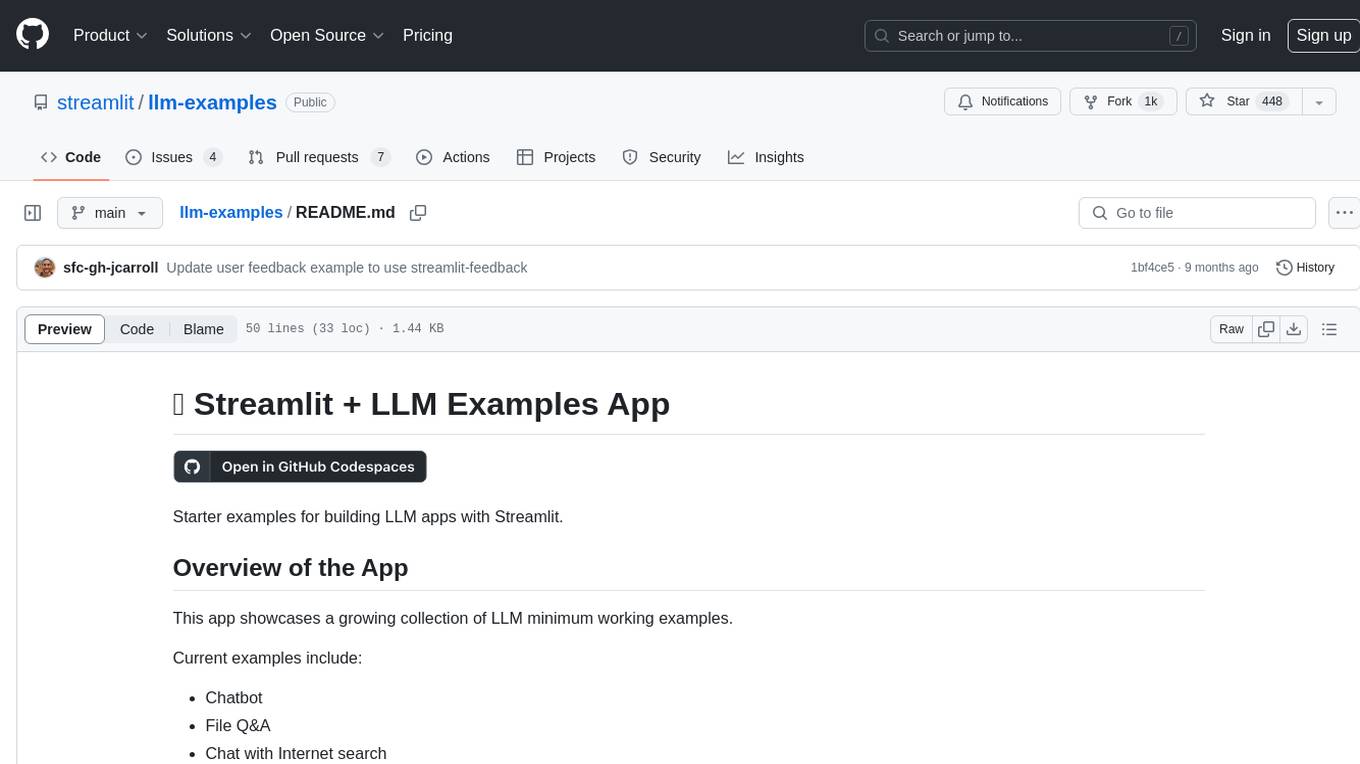
llm-examples
Starter examples for building LLM apps with Streamlit. This repository showcases a growing collection of LLM minimum working examples, including a Chatbot, File Q&A, Chat with Internet search, LangChain Quickstart, LangChain PromptTemplate, and Chat with user feedback. Users can easily get their own OpenAI API key and set it as an environment variable in Streamlit apps to run the examples locally.

LMOps
LMOps is a research initiative focusing on fundamental research and technology for building AI products with foundation models, particularly enabling AI capabilities with Large Language Models (LLMs) and Generative AI models. The project explores various aspects such as prompt optimization, longer context handling, LLM alignment, acceleration of LLMs, LLM customization, and understanding in-context learning. It also includes tools like Promptist for automatic prompt optimization, Structured Prompting for efficient long-sequence prompts consumption, and X-Prompt for extensible prompts beyond natural language. Additionally, LLMA accelerators are developed to speed up LLM inference by referencing and copying text spans from documents. The project aims to advance technologies that facilitate prompting language models and enhance the performance of LLMs in various scenarios.
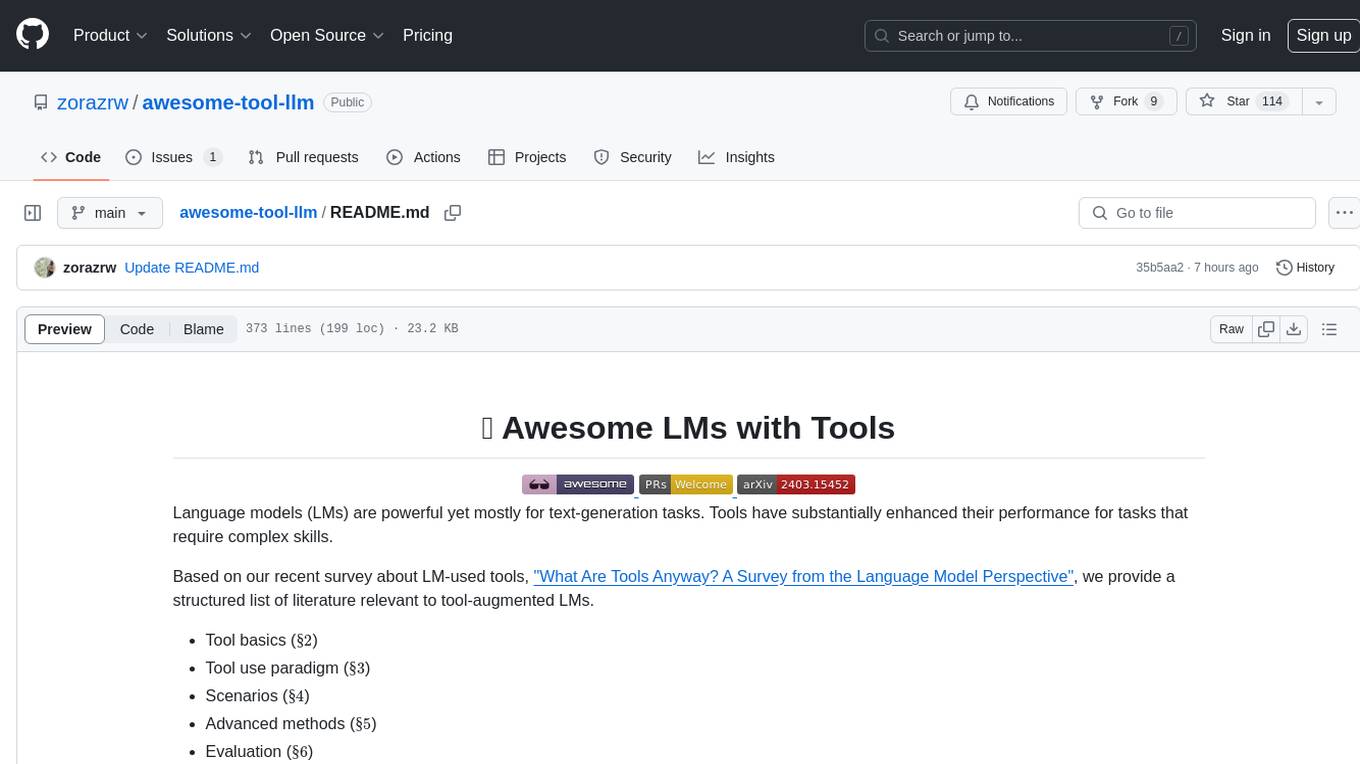
awesome-tool-llm
This repository focuses on exploring tools that enhance the performance of language models for various tasks. It provides a structured list of literature relevant to tool-augmented language models, covering topics such as tool basics, tool use paradigm, scenarios, advanced methods, and evaluation. The repository includes papers, preprints, and books that discuss the use of tools in conjunction with language models for tasks like reasoning, question answering, mathematical calculations, accessing knowledge, interacting with the world, and handling non-textual modalities.
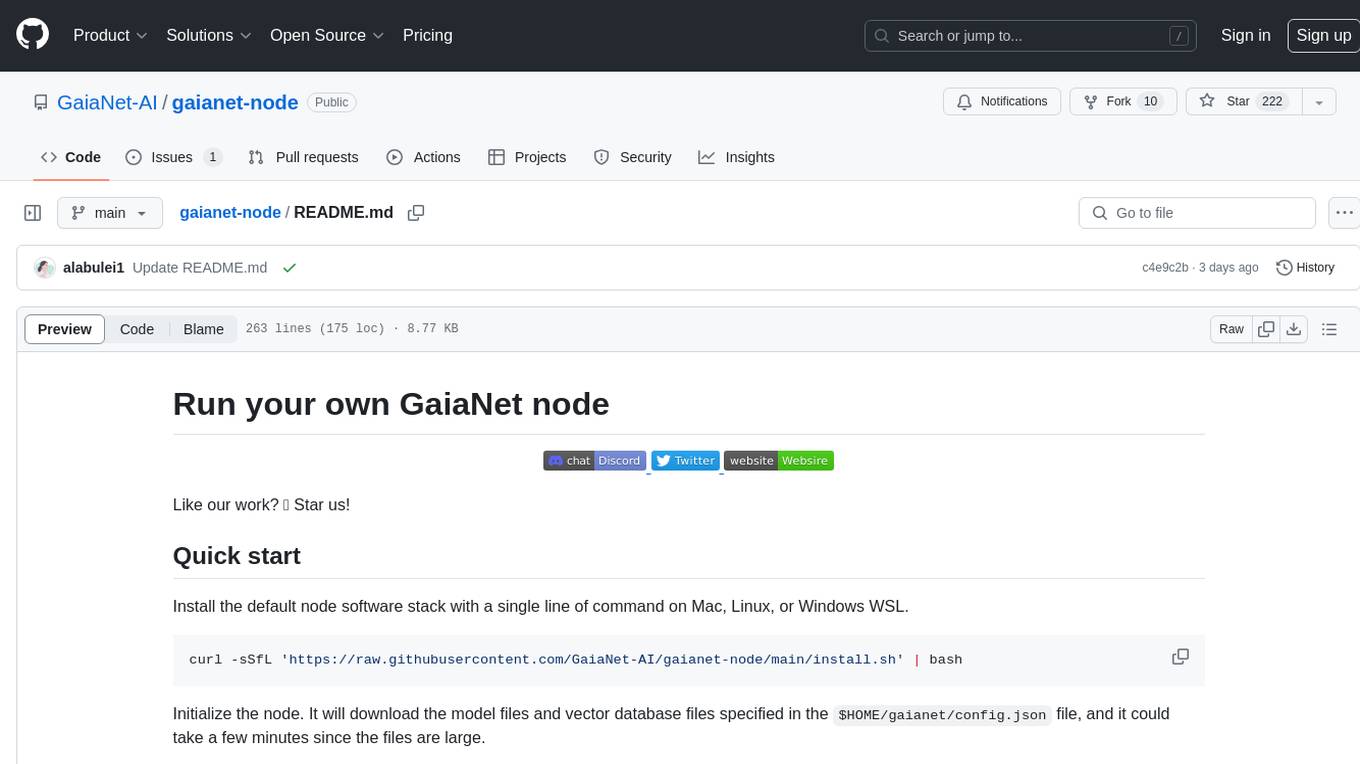
gaianet-node
GaiaNet-node is a tool that allows users to run their own GaiaNet node, enabling them to interact with an AI agent. The tool provides functionalities to install the default node software stack, initialize the node with model files and vector database files, start the node, stop the node, and update configurations. Users can use pre-set configurations or pass a custom URL for initialization. The tool is designed to facilitate communication with the AI agent and access node information via a browser. GaiaNet-node requires sudo privilege for installation but can also be installed without sudo privileges with specific commands.
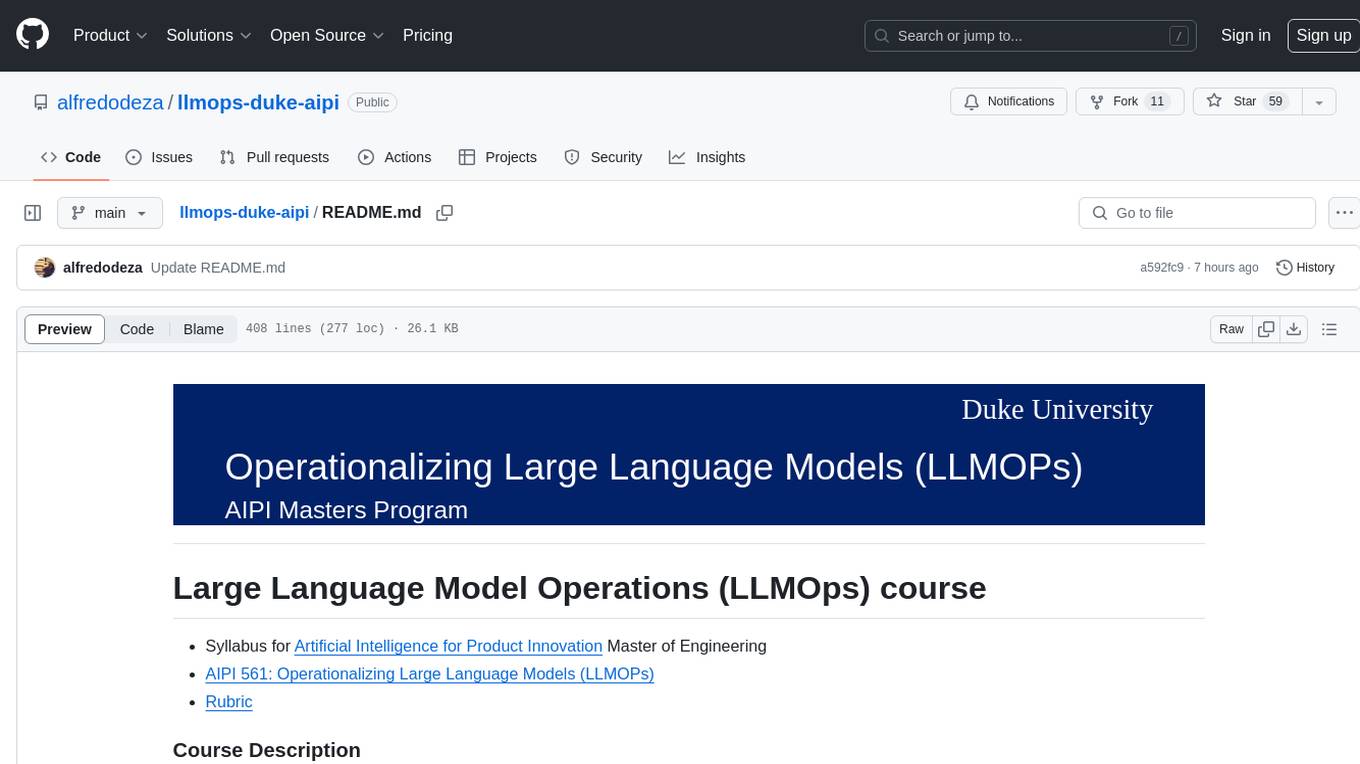
llmops-duke-aipi
LLMOps Duke AIPI is a course focused on operationalizing Large Language Models, teaching methodologies for developing applications using software development best practices with large language models. The course covers various topics such as generative AI concepts, setting up development environments, interacting with large language models, using local large language models, applied solutions with LLMs, extensibility using plugins and functions, retrieval augmented generation, introduction to Python web frameworks for APIs, DevOps principles, deploying machine learning APIs, LLM platforms, and final presentations. Students will learn to build, share, and present portfolios using Github, YouTube, and Linkedin, as well as develop non-linear life-long learning skills. Prerequisites include basic Linux and programming skills, with coursework available in Python or Rust. Additional resources and references are provided for further learning and exploration.
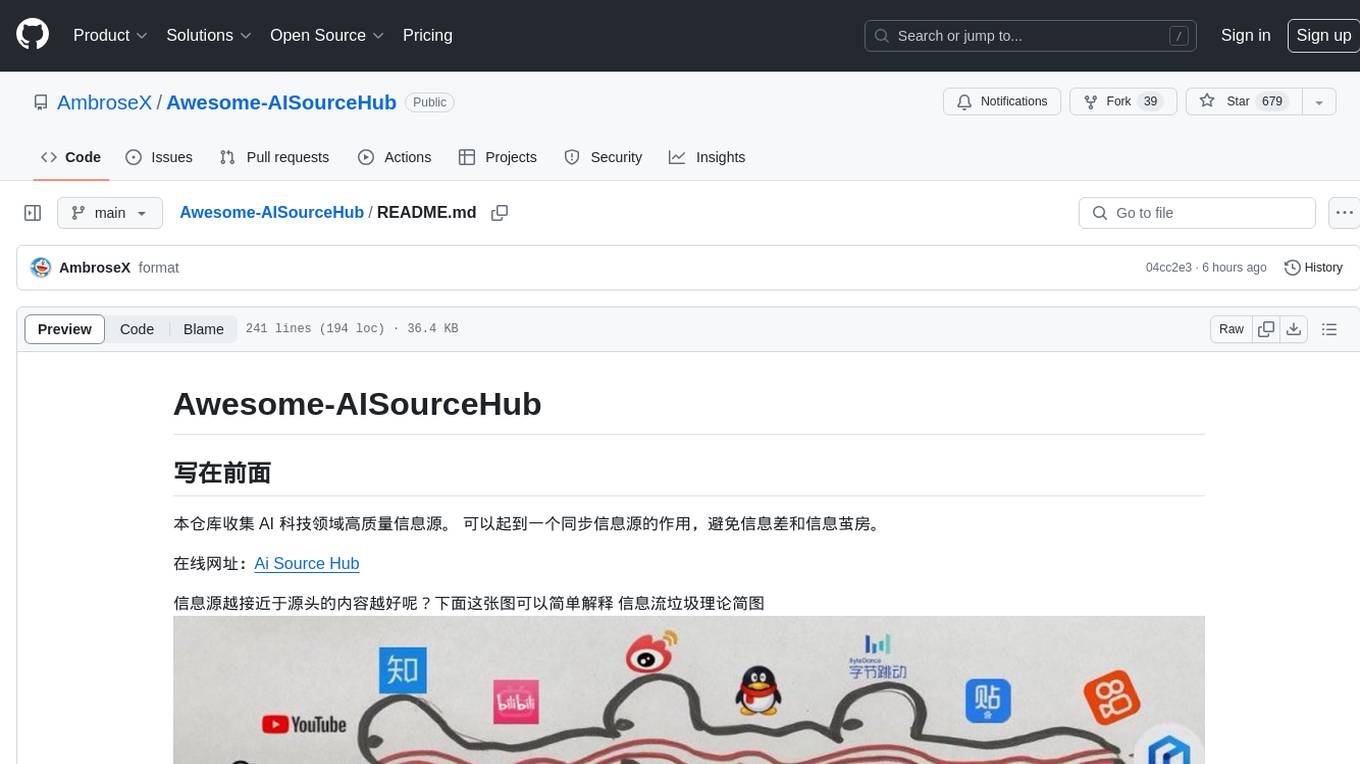
Awesome-AISourceHub
Awesome-AISourceHub is a repository that collects high-quality information sources in the field of AI technology. It serves as a synchronized source of information to avoid information gaps and information silos. The repository aims to provide valuable resources for individuals such as AI book authors, enterprise decision-makers, and tool developers who frequently use Twitter to share insights and updates related to AI advancements. The platform emphasizes the importance of accessing information closer to the source for better quality content. Users can contribute their own high-quality information sources to the repository by following specific steps outlined in the contribution guidelines. The repository covers various platforms such as Twitter, public accounts, knowledge planets, podcasts, blogs, websites, YouTube channels, and more, offering a comprehensive collection of AI-related resources for individuals interested in staying updated with the latest trends and developments in the AI field.